Organisational Behaviour and Leadership
VerifiedAdded on 2020/10/23
|18
|5483
|150
AI Summary
This assignment is a study of organisational behaviour, including leadership theories such as Path-Goal Theory, Motivational Theories, and Handy's Model of Organisational Culture. It also covers Tuckman's stages of team development and Raven and French Model of organisational Power. The study examines the impact of workplace spirituality dimensions on organisational citizenship behaviour among nurses, employee green behaviour, and pro-environmental behaviour change. Various sources such as journals, books, and online resources are referenced to provide a comprehensive analysis of organisational behaviour and leadership.
Contribute Materials
Your contribution can guide someone’s learning journey. Share your
documents today.
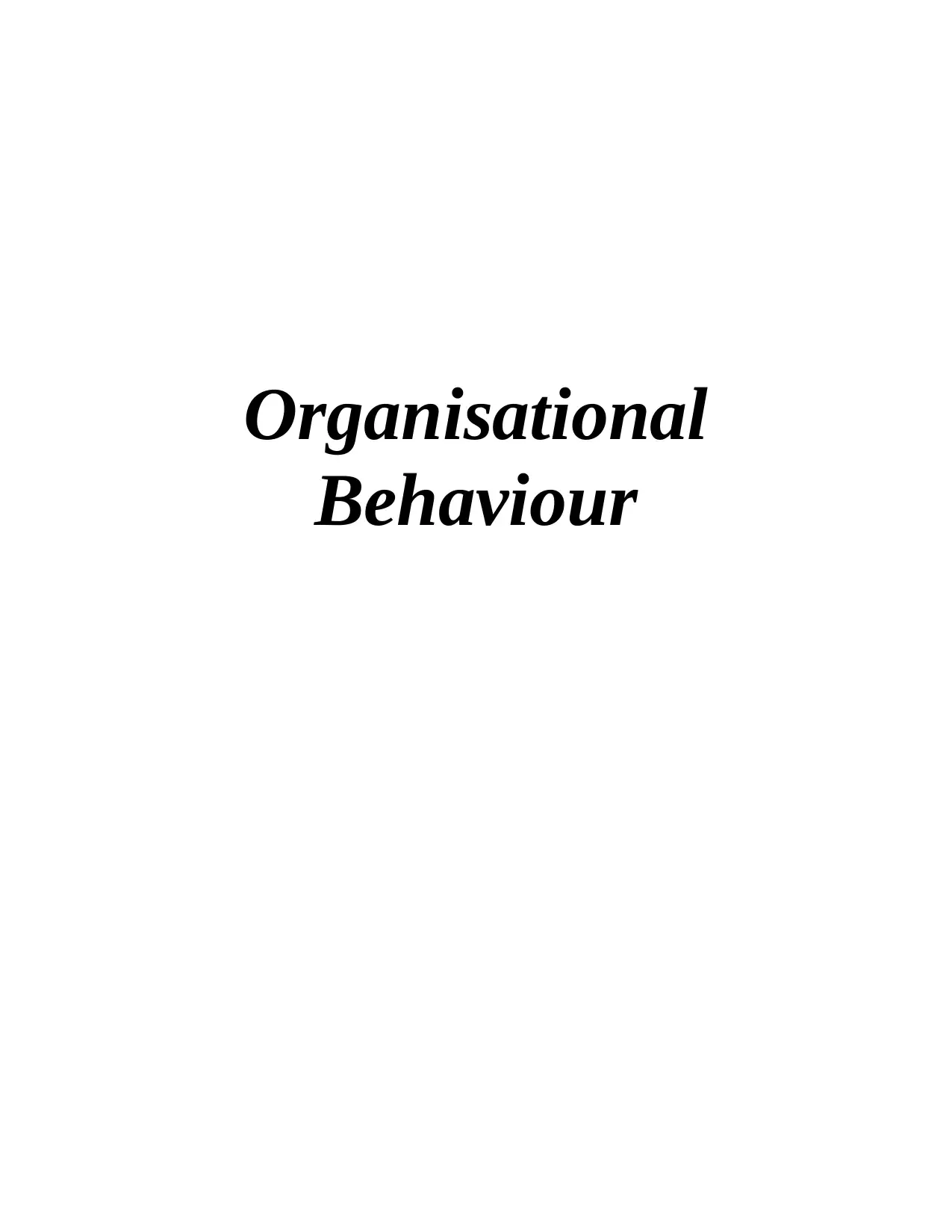
Organisational
Behaviour
Behaviour
Secure Best Marks with AI Grader
Need help grading? Try our AI Grader for instant feedback on your assignments.
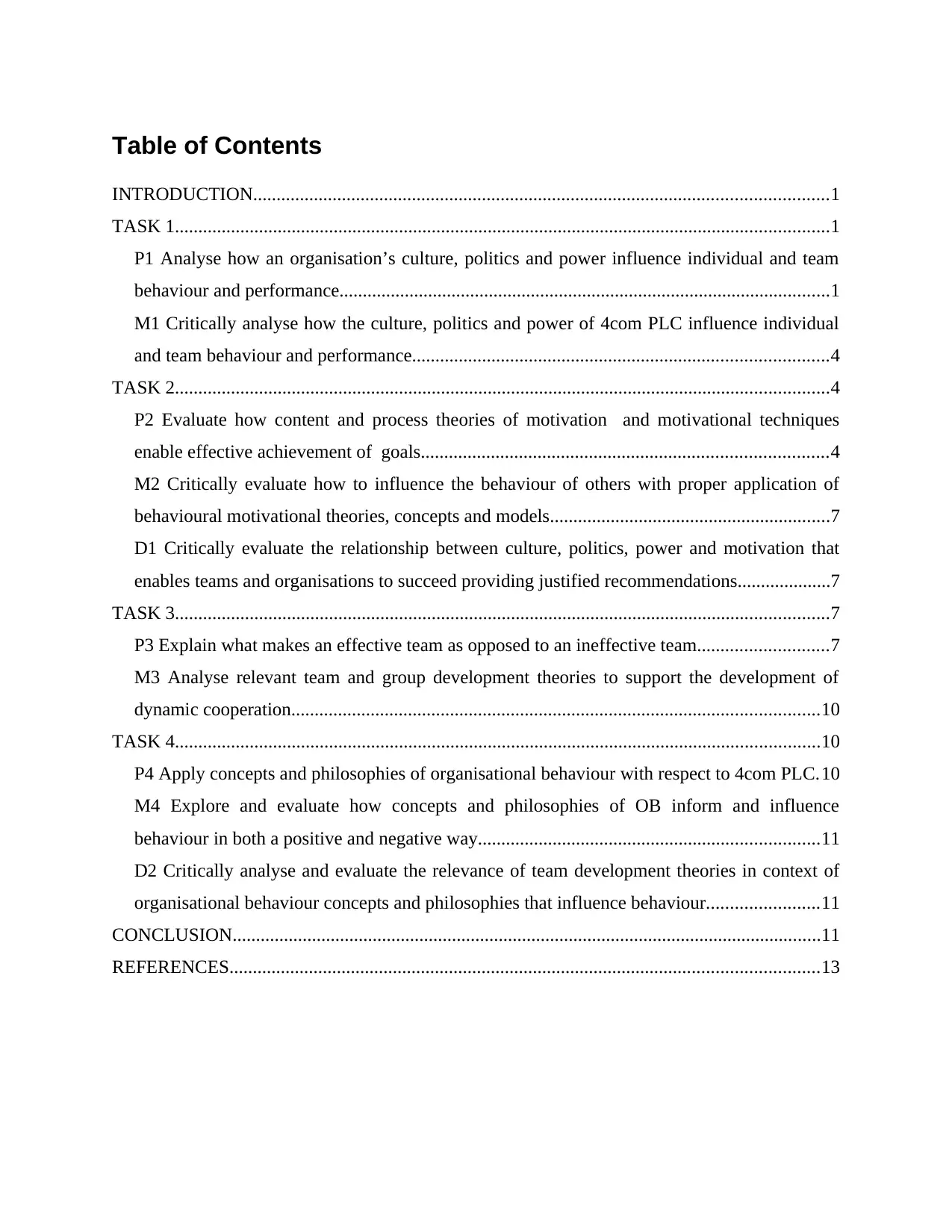
Table of Contents
INTRODUCTION...........................................................................................................................1
TASK 1............................................................................................................................................1
P1 Analyse how an organisation’s culture, politics and power influence individual and team
behaviour and performance.........................................................................................................1
M1 Critically analyse how the culture, politics and power of 4com PLC influence individual
and team behaviour and performance.........................................................................................4
TASK 2............................................................................................................................................4
P2 Evaluate how content and process theories of motivation and motivational techniques
enable effective achievement of goals.......................................................................................4
M2 Critically evaluate how to influence the behaviour of others with proper application of
behavioural motivational theories, concepts and models............................................................7
D1 Critically evaluate the relationship between culture, politics, power and motivation that
enables teams and organisations to succeed providing justified recommendations....................7
TASK 3............................................................................................................................................7
P3 Explain what makes an effective team as opposed to an ineffective team............................7
M3 Analyse relevant team and group development theories to support the development of
dynamic cooperation.................................................................................................................10
TASK 4..........................................................................................................................................10
P4 Apply concepts and philosophies of organisational behaviour with respect to 4com PLC.10
M4 Explore and evaluate how concepts and philosophies of OB inform and influence
behaviour in both a positive and negative way.........................................................................11
D2 Critically analyse and evaluate the relevance of team development theories in context of
organisational behaviour concepts and philosophies that influence behaviour........................11
CONCLUSION..............................................................................................................................11
REFERENCES..............................................................................................................................13
INTRODUCTION...........................................................................................................................1
TASK 1............................................................................................................................................1
P1 Analyse how an organisation’s culture, politics and power influence individual and team
behaviour and performance.........................................................................................................1
M1 Critically analyse how the culture, politics and power of 4com PLC influence individual
and team behaviour and performance.........................................................................................4
TASK 2............................................................................................................................................4
P2 Evaluate how content and process theories of motivation and motivational techniques
enable effective achievement of goals.......................................................................................4
M2 Critically evaluate how to influence the behaviour of others with proper application of
behavioural motivational theories, concepts and models............................................................7
D1 Critically evaluate the relationship between culture, politics, power and motivation that
enables teams and organisations to succeed providing justified recommendations....................7
TASK 3............................................................................................................................................7
P3 Explain what makes an effective team as opposed to an ineffective team............................7
M3 Analyse relevant team and group development theories to support the development of
dynamic cooperation.................................................................................................................10
TASK 4..........................................................................................................................................10
P4 Apply concepts and philosophies of organisational behaviour with respect to 4com PLC.10
M4 Explore and evaluate how concepts and philosophies of OB inform and influence
behaviour in both a positive and negative way.........................................................................11
D2 Critically analyse and evaluate the relevance of team development theories in context of
organisational behaviour concepts and philosophies that influence behaviour........................11
CONCLUSION..............................................................................................................................11
REFERENCES..............................................................................................................................13
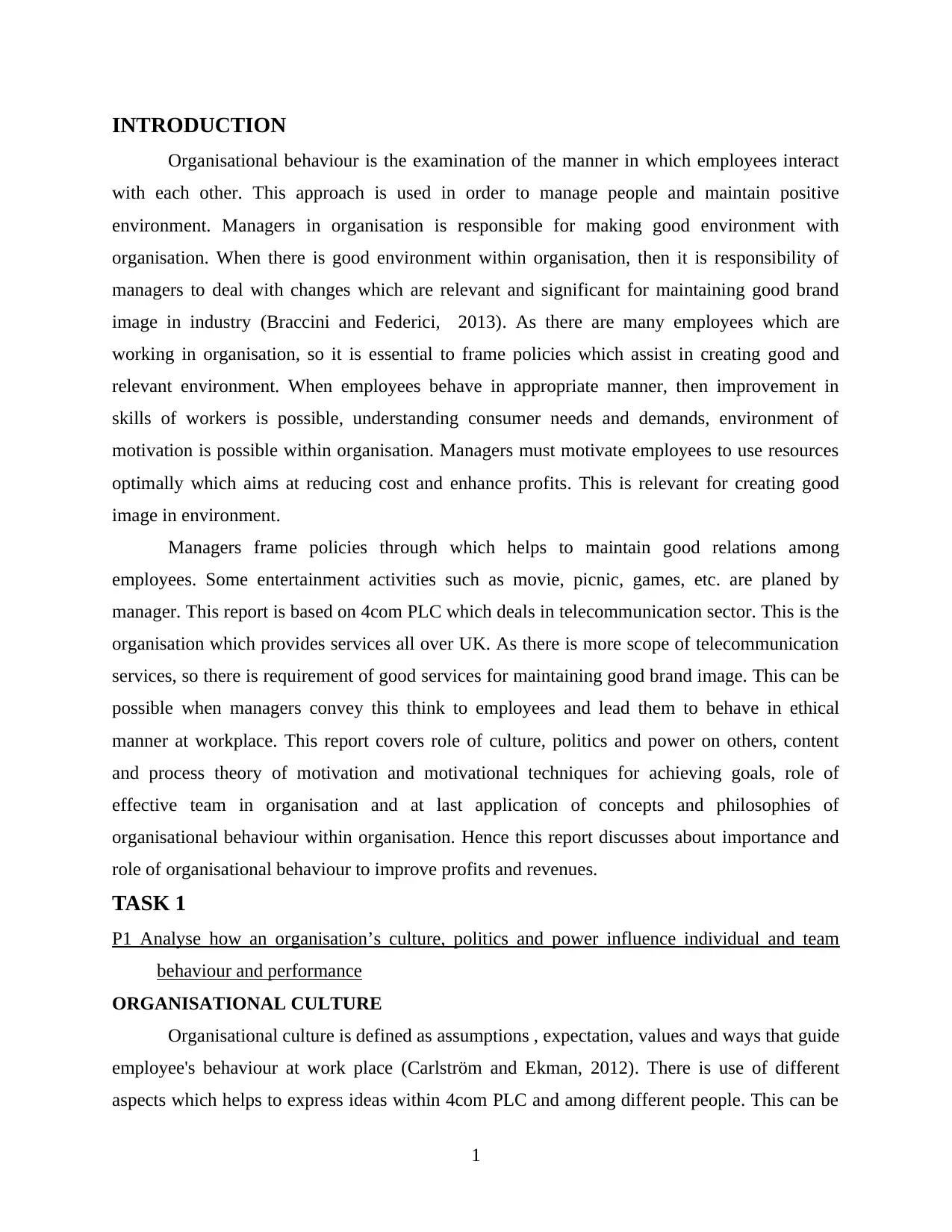
INTRODUCTION
Organisational behaviour is the examination of the manner in which employees interact
with each other. This approach is used in order to manage people and maintain positive
environment. Managers in organisation is responsible for making good environment with
organisation. When there is good environment within organisation, then it is responsibility of
managers to deal with changes which are relevant and significant for maintaining good brand
image in industry (Braccini and Federici, 2013). As there are many employees which are
working in organisation, so it is essential to frame policies which assist in creating good and
relevant environment. When employees behave in appropriate manner, then improvement in
skills of workers is possible, understanding consumer needs and demands, environment of
motivation is possible within organisation. Managers must motivate employees to use resources
optimally which aims at reducing cost and enhance profits. This is relevant for creating good
image in environment.
Managers frame policies through which helps to maintain good relations among
employees. Some entertainment activities such as movie, picnic, games, etc. are planed by
manager. This report is based on 4com PLC which deals in telecommunication sector. This is the
organisation which provides services all over UK. As there is more scope of telecommunication
services, so there is requirement of good services for maintaining good brand image. This can be
possible when managers convey this think to employees and lead them to behave in ethical
manner at workplace. This report covers role of culture, politics and power on others, content
and process theory of motivation and motivational techniques for achieving goals, role of
effective team in organisation and at last application of concepts and philosophies of
organisational behaviour within organisation. Hence this report discusses about importance and
role of organisational behaviour to improve profits and revenues.
TASK 1
P1 Analyse how an organisation’s culture, politics and power influence individual and team
behaviour and performance
ORGANISATIONAL CULTURE
Organisational culture is defined as assumptions , expectation, values and ways that guide
employee's behaviour at work place (Carlström and Ekman, 2012). There is use of different
aspects which helps to express ideas within 4com PLC and among different people. This can be
1
Organisational behaviour is the examination of the manner in which employees interact
with each other. This approach is used in order to manage people and maintain positive
environment. Managers in organisation is responsible for making good environment with
organisation. When there is good environment within organisation, then it is responsibility of
managers to deal with changes which are relevant and significant for maintaining good brand
image in industry (Braccini and Federici, 2013). As there are many employees which are
working in organisation, so it is essential to frame policies which assist in creating good and
relevant environment. When employees behave in appropriate manner, then improvement in
skills of workers is possible, understanding consumer needs and demands, environment of
motivation is possible within organisation. Managers must motivate employees to use resources
optimally which aims at reducing cost and enhance profits. This is relevant for creating good
image in environment.
Managers frame policies through which helps to maintain good relations among
employees. Some entertainment activities such as movie, picnic, games, etc. are planed by
manager. This report is based on 4com PLC which deals in telecommunication sector. This is the
organisation which provides services all over UK. As there is more scope of telecommunication
services, so there is requirement of good services for maintaining good brand image. This can be
possible when managers convey this think to employees and lead them to behave in ethical
manner at workplace. This report covers role of culture, politics and power on others, content
and process theory of motivation and motivational techniques for achieving goals, role of
effective team in organisation and at last application of concepts and philosophies of
organisational behaviour within organisation. Hence this report discusses about importance and
role of organisational behaviour to improve profits and revenues.
TASK 1
P1 Analyse how an organisation’s culture, politics and power influence individual and team
behaviour and performance
ORGANISATIONAL CULTURE
Organisational culture is defined as assumptions , expectation, values and ways that guide
employee's behaviour at work place (Carlström and Ekman, 2012). There is use of different
aspects which helps to express ideas within 4com PLC and among different people. This can be
1
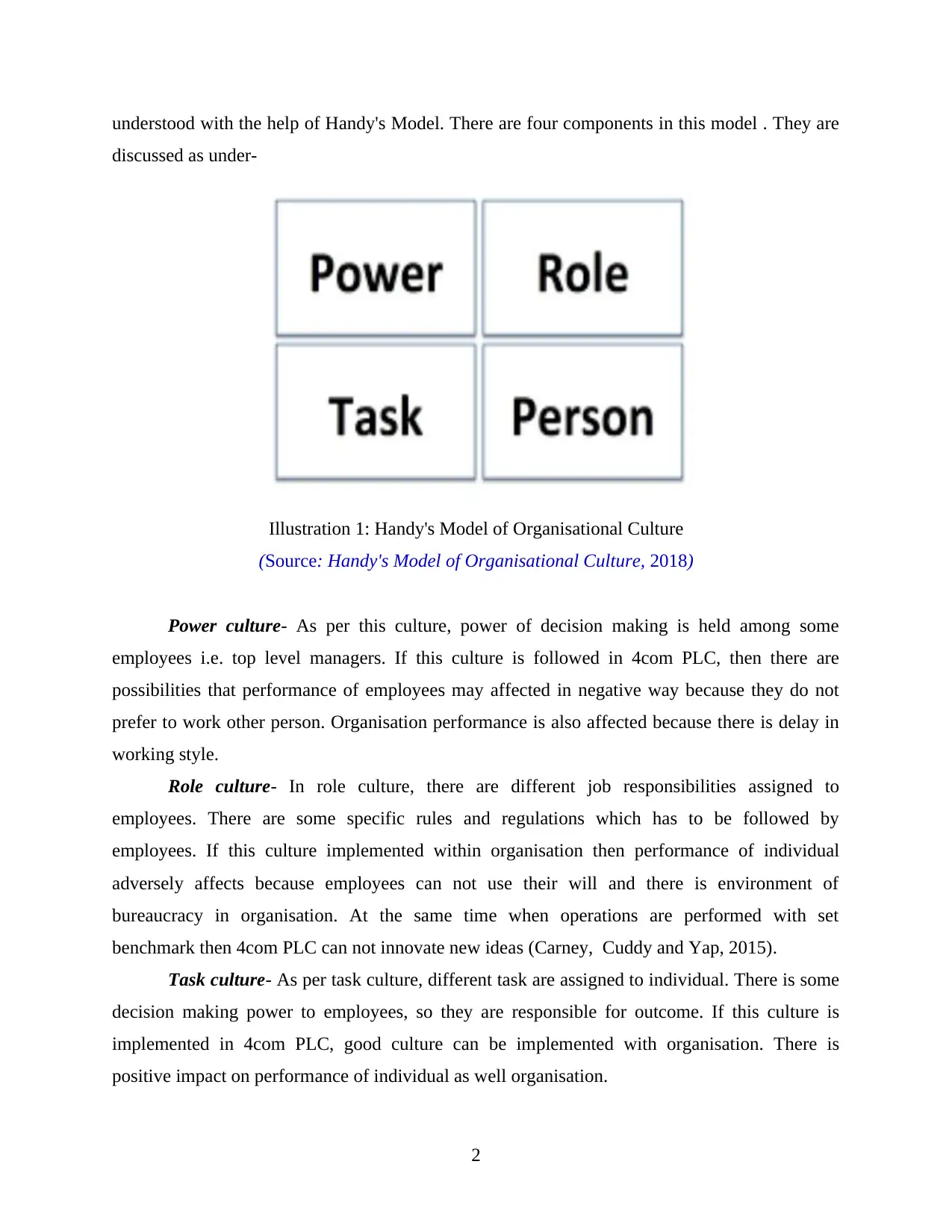
understood with the help of Handy's Model. There are four components in this model . They are
discussed as under-
(Source: Handy's Model of Organisational Culture, 2018)
Power culture- As per this culture, power of decision making is held among some
employees i.e. top level managers. If this culture is followed in 4com PLC, then there are
possibilities that performance of employees may affected in negative way because they do not
prefer to work other person. Organisation performance is also affected because there is delay in
working style.
Role culture- In role culture, there are different job responsibilities assigned to
employees. There are some specific rules and regulations which has to be followed by
employees. If this culture implemented within organisation then performance of individual
adversely affects because employees can not use their will and there is environment of
bureaucracy in organisation. At the same time when operations are performed with set
benchmark then 4com PLC can not innovate new ideas (Carney, Cuddy and Yap, 2015).
Task culture- As per task culture, different task are assigned to individual. There is some
decision making power to employees, so they are responsible for outcome. If this culture is
implemented in 4com PLC, good culture can be implemented with organisation. There is
positive impact on performance of individual as well organisation.
2
Illustration 1: Handy's Model of Organisational Culture
discussed as under-
(Source: Handy's Model of Organisational Culture, 2018)
Power culture- As per this culture, power of decision making is held among some
employees i.e. top level managers. If this culture is followed in 4com PLC, then there are
possibilities that performance of employees may affected in negative way because they do not
prefer to work other person. Organisation performance is also affected because there is delay in
working style.
Role culture- In role culture, there are different job responsibilities assigned to
employees. There are some specific rules and regulations which has to be followed by
employees. If this culture implemented within organisation then performance of individual
adversely affects because employees can not use their will and there is environment of
bureaucracy in organisation. At the same time when operations are performed with set
benchmark then 4com PLC can not innovate new ideas (Carney, Cuddy and Yap, 2015).
Task culture- As per task culture, different task are assigned to individual. There is some
decision making power to employees, so they are responsible for outcome. If this culture is
implemented in 4com PLC, good culture can be implemented with organisation. There is
positive impact on performance of individual as well organisation.
2
Illustration 1: Handy's Model of Organisational Culture
Secure Best Marks with AI Grader
Need help grading? Try our AI Grader for instant feedback on your assignments.
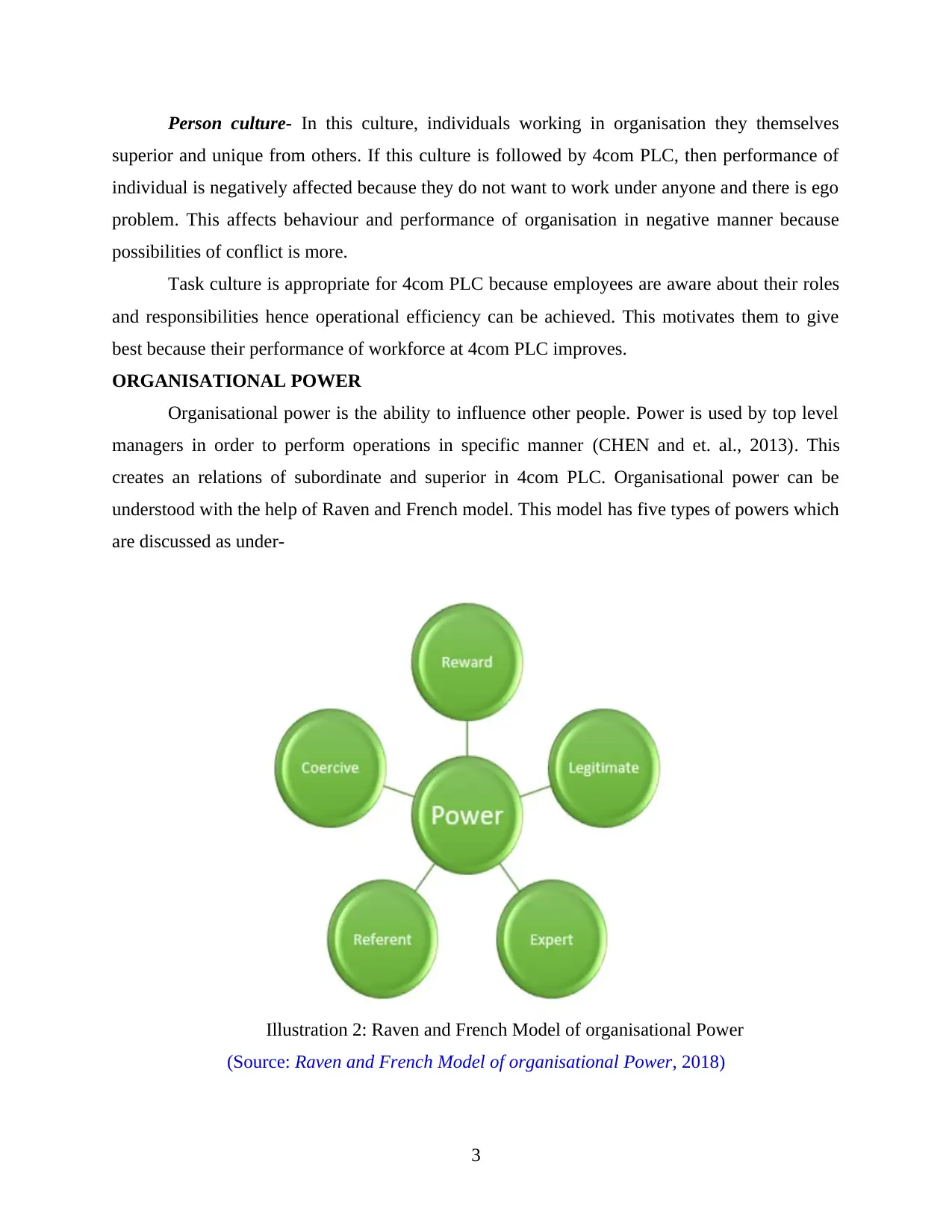
Person culture- In this culture, individuals working in organisation they themselves
superior and unique from others. If this culture is followed by 4com PLC, then performance of
individual is negatively affected because they do not want to work under anyone and there is ego
problem. This affects behaviour and performance of organisation in negative manner because
possibilities of conflict is more.
Task culture is appropriate for 4com PLC because employees are aware about their roles
and responsibilities hence operational efficiency can be achieved. This motivates them to give
best because their performance of workforce at 4com PLC improves.
ORGANISATIONAL POWER
Organisational power is the ability to influence other people. Power is used by top level
managers in order to perform operations in specific manner (CHEN and et. al., 2013). This
creates an relations of subordinate and superior in 4com PLC. Organisational power can be
understood with the help of Raven and French model. This model has five types of powers which
are discussed as under-
(Source: Raven and French Model of organisational Power, 2018)
3
Illustration 2: Raven and French Model of organisational Power
superior and unique from others. If this culture is followed by 4com PLC, then performance of
individual is negatively affected because they do not want to work under anyone and there is ego
problem. This affects behaviour and performance of organisation in negative manner because
possibilities of conflict is more.
Task culture is appropriate for 4com PLC because employees are aware about their roles
and responsibilities hence operational efficiency can be achieved. This motivates them to give
best because their performance of workforce at 4com PLC improves.
ORGANISATIONAL POWER
Organisational power is the ability to influence other people. Power is used by top level
managers in order to perform operations in specific manner (CHEN and et. al., 2013). This
creates an relations of subordinate and superior in 4com PLC. Organisational power can be
understood with the help of Raven and French model. This model has five types of powers which
are discussed as under-
(Source: Raven and French Model of organisational Power, 2018)
3
Illustration 2: Raven and French Model of organisational Power
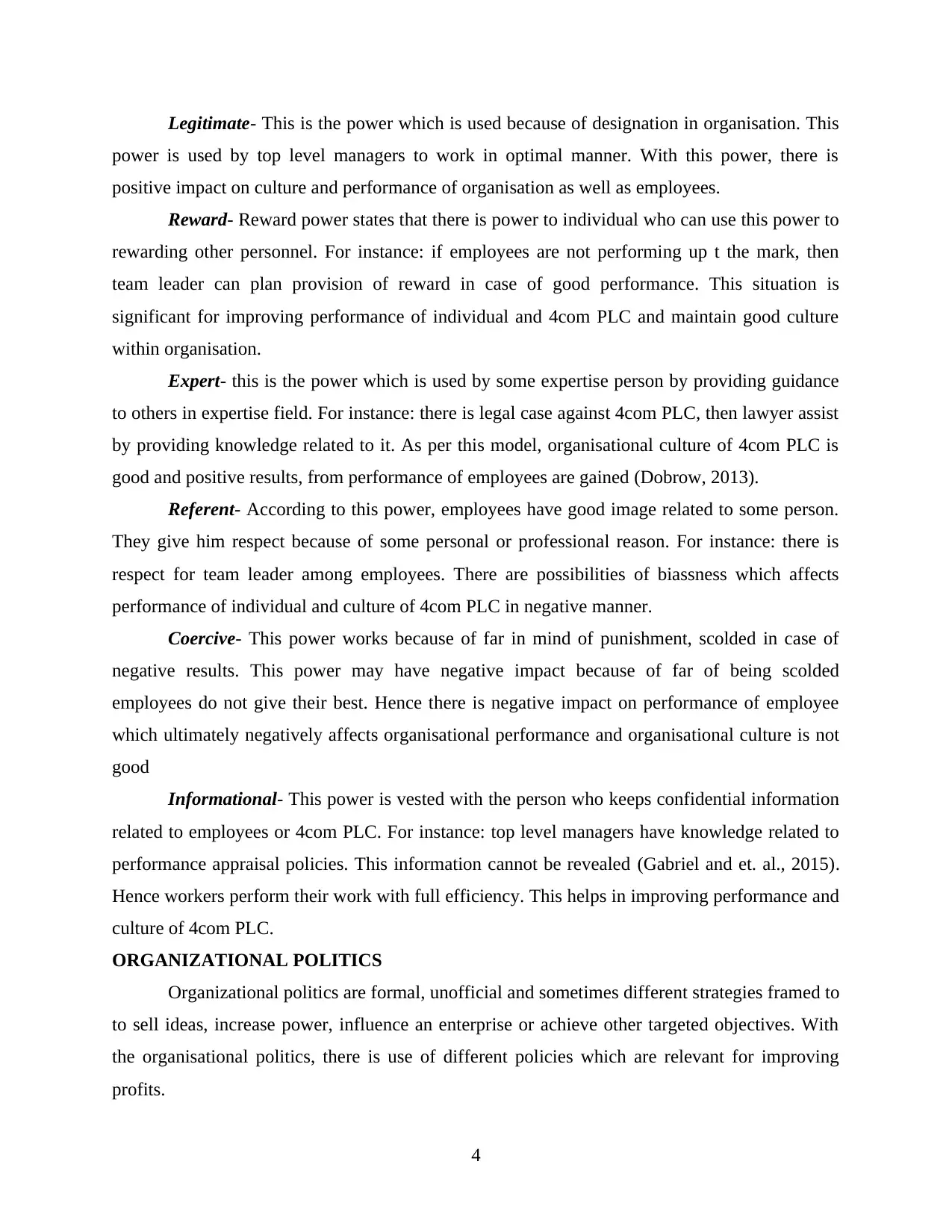
Legitimate- This is the power which is used because of designation in organisation. This
power is used by top level managers to work in optimal manner. With this power, there is
positive impact on culture and performance of organisation as well as employees.
Reward- Reward power states that there is power to individual who can use this power to
rewarding other personnel. For instance: if employees are not performing up t the mark, then
team leader can plan provision of reward in case of good performance. This situation is
significant for improving performance of individual and 4com PLC and maintain good culture
within organisation.
Expert- this is the power which is used by some expertise person by providing guidance
to others in expertise field. For instance: there is legal case against 4com PLC, then lawyer assist
by providing knowledge related to it. As per this model, organisational culture of 4com PLC is
good and positive results, from performance of employees are gained (Dobrow, 2013).
Referent- According to this power, employees have good image related to some person.
They give him respect because of some personal or professional reason. For instance: there is
respect for team leader among employees. There are possibilities of biassness which affects
performance of individual and culture of 4com PLC in negative manner.
Coercive- This power works because of far in mind of punishment, scolded in case of
negative results. This power may have negative impact because of far of being scolded
employees do not give their best. Hence there is negative impact on performance of employee
which ultimately negatively affects organisational performance and organisational culture is not
good
Informational- This power is vested with the person who keeps confidential information
related to employees or 4com PLC. For instance: top level managers have knowledge related to
performance appraisal policies. This information cannot be revealed (Gabriel and et. al., 2015).
Hence workers perform their work with full efficiency. This helps in improving performance and
culture of 4com PLC.
ORGANIZATIONAL POLITICS
Organizational politics are formal, unofficial and sometimes different strategies framed to
to sell ideas, increase power, influence an enterprise or achieve other targeted objectives. With
the organisational politics, there is use of different policies which are relevant for improving
profits.
4
power is used by top level managers to work in optimal manner. With this power, there is
positive impact on culture and performance of organisation as well as employees.
Reward- Reward power states that there is power to individual who can use this power to
rewarding other personnel. For instance: if employees are not performing up t the mark, then
team leader can plan provision of reward in case of good performance. This situation is
significant for improving performance of individual and 4com PLC and maintain good culture
within organisation.
Expert- this is the power which is used by some expertise person by providing guidance
to others in expertise field. For instance: there is legal case against 4com PLC, then lawyer assist
by providing knowledge related to it. As per this model, organisational culture of 4com PLC is
good and positive results, from performance of employees are gained (Dobrow, 2013).
Referent- According to this power, employees have good image related to some person.
They give him respect because of some personal or professional reason. For instance: there is
respect for team leader among employees. There are possibilities of biassness which affects
performance of individual and culture of 4com PLC in negative manner.
Coercive- This power works because of far in mind of punishment, scolded in case of
negative results. This power may have negative impact because of far of being scolded
employees do not give their best. Hence there is negative impact on performance of employee
which ultimately negatively affects organisational performance and organisational culture is not
good
Informational- This power is vested with the person who keeps confidential information
related to employees or 4com PLC. For instance: top level managers have knowledge related to
performance appraisal policies. This information cannot be revealed (Gabriel and et. al., 2015).
Hence workers perform their work with full efficiency. This helps in improving performance and
culture of 4com PLC.
ORGANIZATIONAL POLITICS
Organizational politics are formal, unofficial and sometimes different strategies framed to
to sell ideas, increase power, influence an enterprise or achieve other targeted objectives. With
the organisational politics, there is use of different policies which are relevant for improving
profits.
4
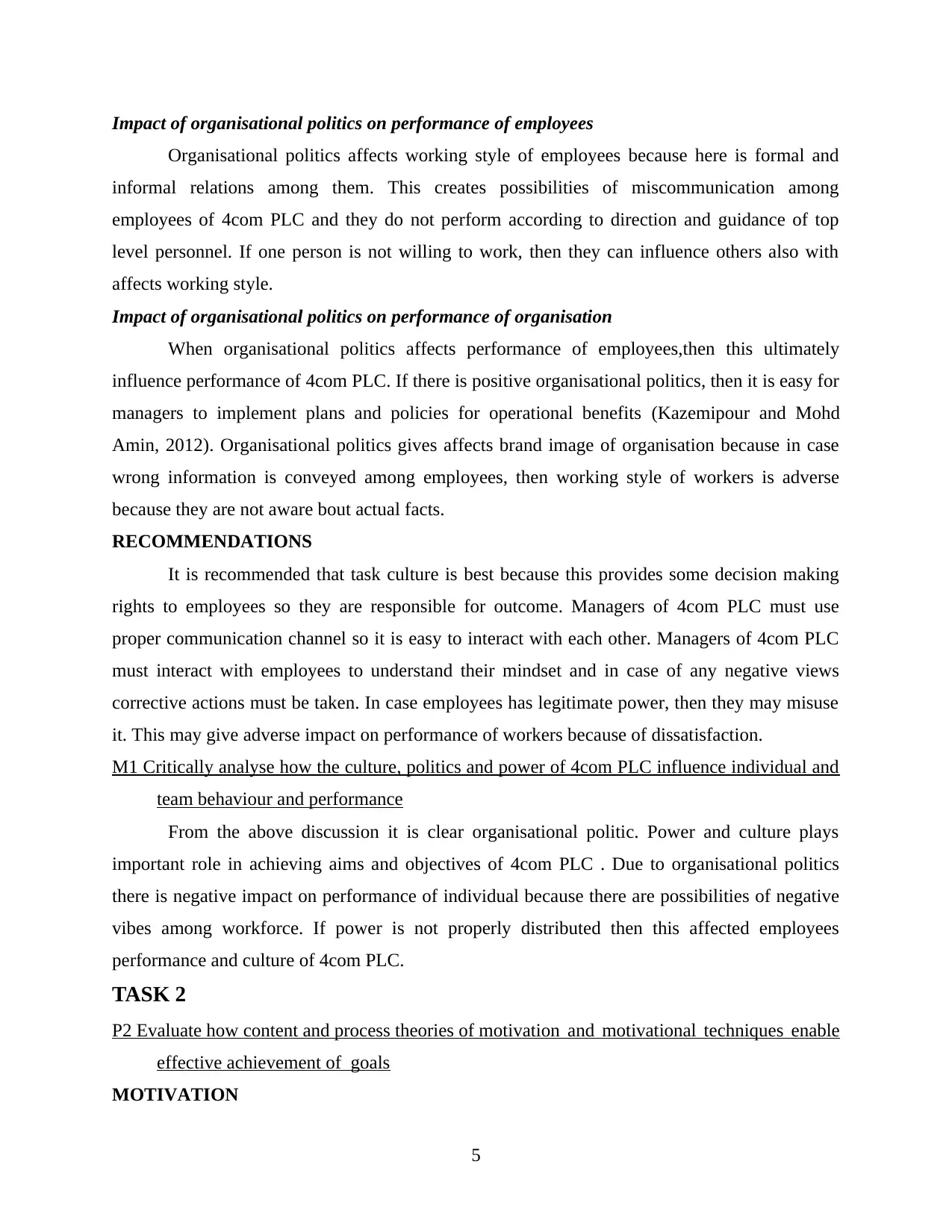
Impact of organisational politics on performance of employees
Organisational politics affects working style of employees because here is formal and
informal relations among them. This creates possibilities of miscommunication among
employees of 4com PLC and they do not perform according to direction and guidance of top
level personnel. If one person is not willing to work, then they can influence others also with
affects working style.
Impact of organisational politics on performance of organisation
When organisational politics affects performance of employees,then this ultimately
influence performance of 4com PLC. If there is positive organisational politics, then it is easy for
managers to implement plans and policies for operational benefits (Kazemipour and Mohd
Amin, 2012). Organisational politics gives affects brand image of organisation because in case
wrong information is conveyed among employees, then working style of workers is adverse
because they are not aware bout actual facts.
RECOMMENDATIONS
It is recommended that task culture is best because this provides some decision making
rights to employees so they are responsible for outcome. Managers of 4com PLC must use
proper communication channel so it is easy to interact with each other. Managers of 4com PLC
must interact with employees to understand their mindset and in case of any negative views
corrective actions must be taken. In case employees has legitimate power, then they may misuse
it. This may give adverse impact on performance of workers because of dissatisfaction.
M1 Critically analyse how the culture, politics and power of 4com PLC influence individual and
team behaviour and performance
From the above discussion it is clear organisational politic. Power and culture plays
important role in achieving aims and objectives of 4com PLC . Due to organisational politics
there is negative impact on performance of individual because there are possibilities of negative
vibes among workforce. If power is not properly distributed then this affected employees
performance and culture of 4com PLC.
TASK 2
P2 Evaluate how content and process theories of motivation and motivational techniques enable
effective achievement of goals
MOTIVATION
5
Organisational politics affects working style of employees because here is formal and
informal relations among them. This creates possibilities of miscommunication among
employees of 4com PLC and they do not perform according to direction and guidance of top
level personnel. If one person is not willing to work, then they can influence others also with
affects working style.
Impact of organisational politics on performance of organisation
When organisational politics affects performance of employees,then this ultimately
influence performance of 4com PLC. If there is positive organisational politics, then it is easy for
managers to implement plans and policies for operational benefits (Kazemipour and Mohd
Amin, 2012). Organisational politics gives affects brand image of organisation because in case
wrong information is conveyed among employees, then working style of workers is adverse
because they are not aware bout actual facts.
RECOMMENDATIONS
It is recommended that task culture is best because this provides some decision making
rights to employees so they are responsible for outcome. Managers of 4com PLC must use
proper communication channel so it is easy to interact with each other. Managers of 4com PLC
must interact with employees to understand their mindset and in case of any negative views
corrective actions must be taken. In case employees has legitimate power, then they may misuse
it. This may give adverse impact on performance of workers because of dissatisfaction.
M1 Critically analyse how the culture, politics and power of 4com PLC influence individual and
team behaviour and performance
From the above discussion it is clear organisational politic. Power and culture plays
important role in achieving aims and objectives of 4com PLC . Due to organisational politics
there is negative impact on performance of individual because there are possibilities of negative
vibes among workforce. If power is not properly distributed then this affected employees
performance and culture of 4com PLC.
TASK 2
P2 Evaluate how content and process theories of motivation and motivational techniques enable
effective achievement of goals
MOTIVATION
5
Paraphrase This Document
Need a fresh take? Get an instant paraphrase of this document with our AI Paraphraser
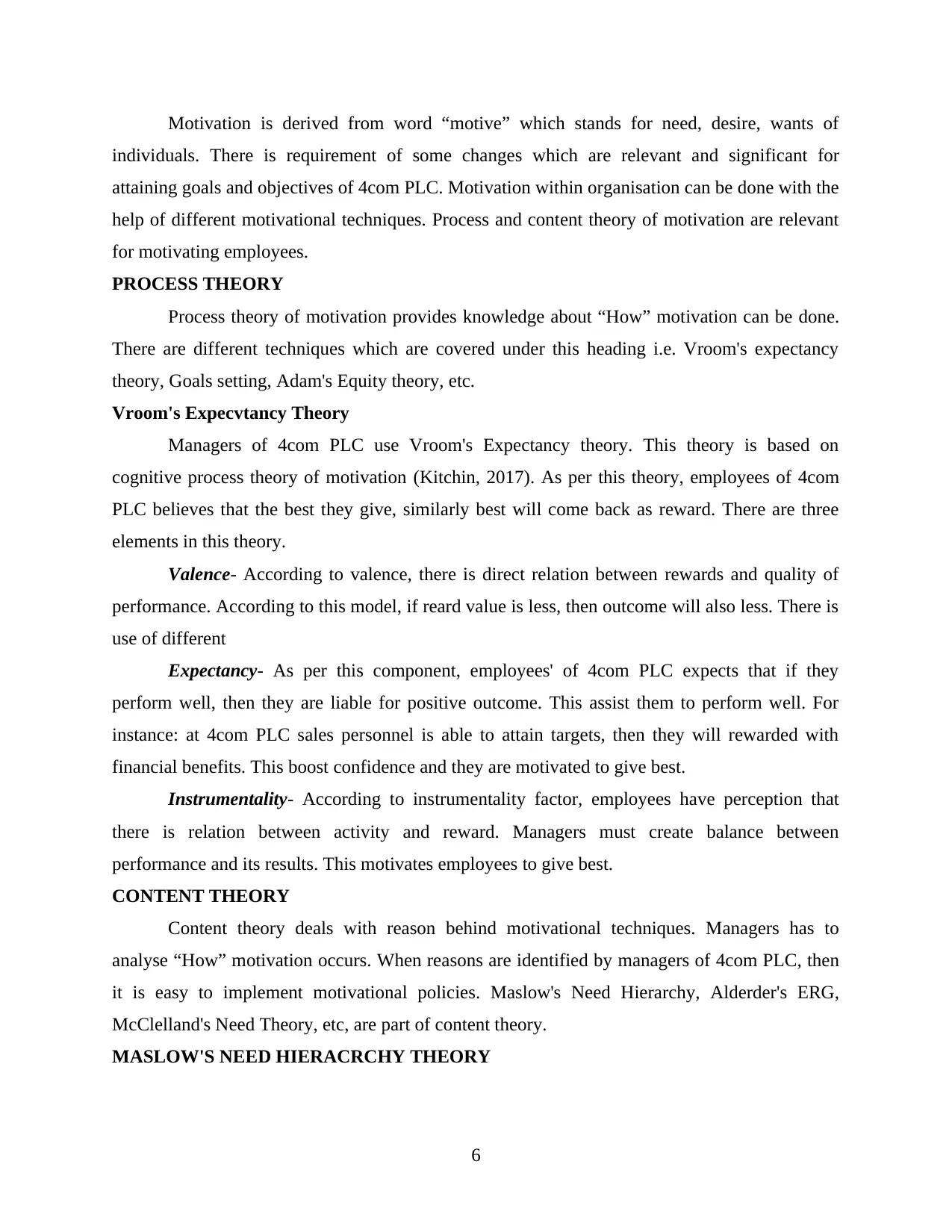
Motivation is derived from word “motive” which stands for need, desire, wants of
individuals. There is requirement of some changes which are relevant and significant for
attaining goals and objectives of 4com PLC. Motivation within organisation can be done with the
help of different motivational techniques. Process and content theory of motivation are relevant
for motivating employees.
PROCESS THEORY
Process theory of motivation provides knowledge about “How” motivation can be done.
There are different techniques which are covered under this heading i.e. Vroom's expectancy
theory, Goals setting, Adam's Equity theory, etc.
Vroom's Expecvtancy Theory
Managers of 4com PLC use Vroom's Expectancy theory. This theory is based on
cognitive process theory of motivation (Kitchin, 2017). As per this theory, employees of 4com
PLC believes that the best they give, similarly best will come back as reward. There are three
elements in this theory.
Valence- According to valence, there is direct relation between rewards and quality of
performance. According to this model, if reard value is less, then outcome will also less. There is
use of different
Expectancy- As per this component, employees' of 4com PLC expects that if they
perform well, then they are liable for positive outcome. This assist them to perform well. For
instance: at 4com PLC sales personnel is able to attain targets, then they will rewarded with
financial benefits. This boost confidence and they are motivated to give best.
Instrumentality- According to instrumentality factor, employees have perception that
there is relation between activity and reward. Managers must create balance between
performance and its results. This motivates employees to give best.
CONTENT THEORY
Content theory deals with reason behind motivational techniques. Managers has to
analyse “How” motivation occurs. When reasons are identified by managers of 4com PLC, then
it is easy to implement motivational policies. Maslow's Need Hierarchy, Alderder's ERG,
McClelland's Need Theory, etc, are part of content theory.
MASLOW'S NEED HIERACRCHY THEORY
6
individuals. There is requirement of some changes which are relevant and significant for
attaining goals and objectives of 4com PLC. Motivation within organisation can be done with the
help of different motivational techniques. Process and content theory of motivation are relevant
for motivating employees.
PROCESS THEORY
Process theory of motivation provides knowledge about “How” motivation can be done.
There are different techniques which are covered under this heading i.e. Vroom's expectancy
theory, Goals setting, Adam's Equity theory, etc.
Vroom's Expecvtancy Theory
Managers of 4com PLC use Vroom's Expectancy theory. This theory is based on
cognitive process theory of motivation (Kitchin, 2017). As per this theory, employees of 4com
PLC believes that the best they give, similarly best will come back as reward. There are three
elements in this theory.
Valence- According to valence, there is direct relation between rewards and quality of
performance. According to this model, if reard value is less, then outcome will also less. There is
use of different
Expectancy- As per this component, employees' of 4com PLC expects that if they
perform well, then they are liable for positive outcome. This assist them to perform well. For
instance: at 4com PLC sales personnel is able to attain targets, then they will rewarded with
financial benefits. This boost confidence and they are motivated to give best.
Instrumentality- According to instrumentality factor, employees have perception that
there is relation between activity and reward. Managers must create balance between
performance and its results. This motivates employees to give best.
CONTENT THEORY
Content theory deals with reason behind motivational techniques. Managers has to
analyse “How” motivation occurs. When reasons are identified by managers of 4com PLC, then
it is easy to implement motivational policies. Maslow's Need Hierarchy, Alderder's ERG,
McClelland's Need Theory, etc, are part of content theory.
MASLOW'S NEED HIERACRCHY THEORY
6
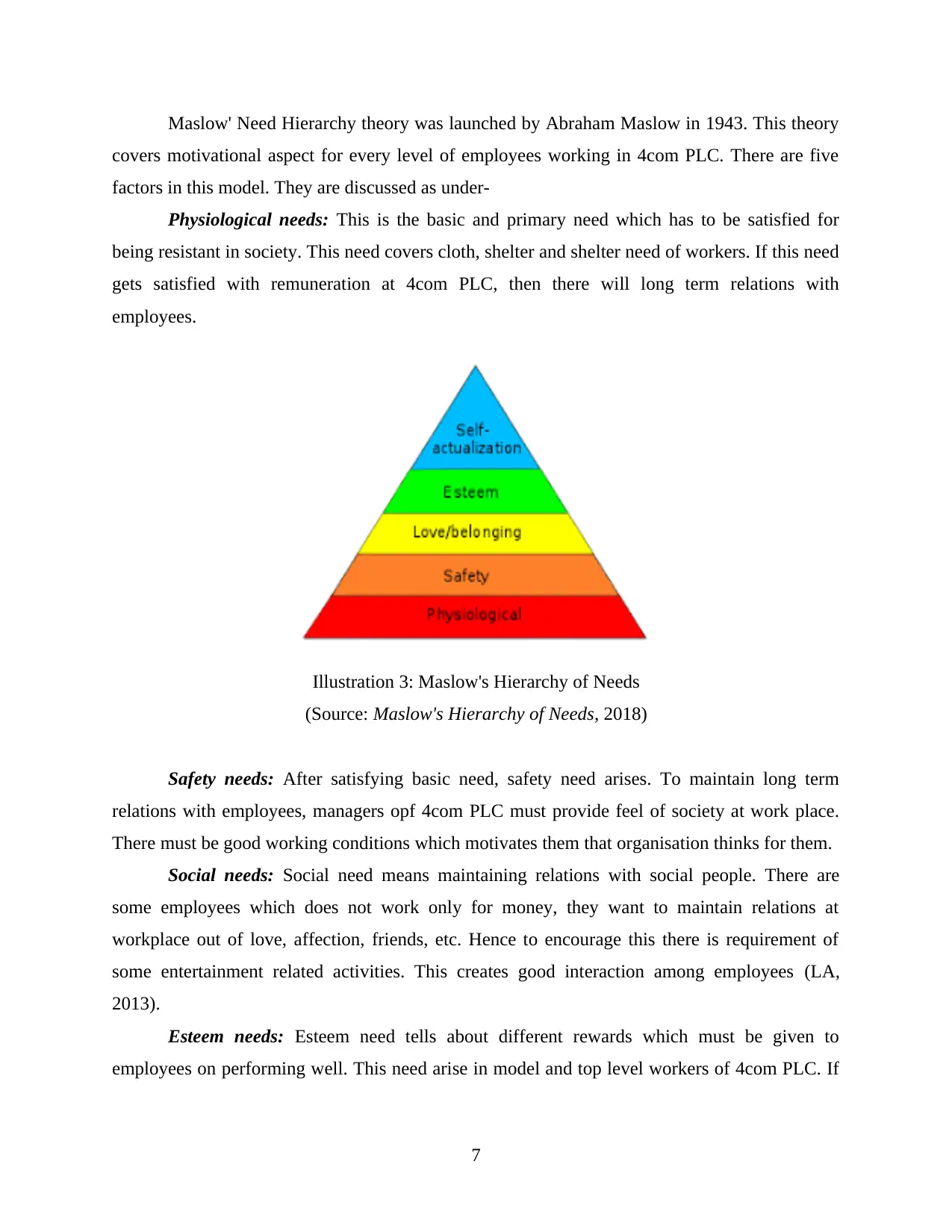
Maslow' Need Hierarchy theory was launched by Abraham Maslow in 1943. This theory
covers motivational aspect for every level of employees working in 4com PLC. There are five
factors in this model. They are discussed as under-
Physiological needs: This is the basic and primary need which has to be satisfied for
being resistant in society. This need covers cloth, shelter and shelter need of workers. If this need
gets satisfied with remuneration at 4com PLC, then there will long term relations with
employees.
(Source: Maslow's Hierarchy of Needs, 2018)
Safety needs: After satisfying basic need, safety need arises. To maintain long term
relations with employees, managers opf 4com PLC must provide feel of society at work place.
There must be good working conditions which motivates them that organisation thinks for them.
Social needs: Social need means maintaining relations with social people. There are
some employees which does not work only for money, they want to maintain relations at
workplace out of love, affection, friends, etc. Hence to encourage this there is requirement of
some entertainment related activities. This creates good interaction among employees (LA,
2013).
Esteem needs: Esteem need tells about different rewards which must be given to
employees on performing well. This need arise in model and top level workers of 4com PLC. If
7
Illustration 3: Maslow's Hierarchy of Needs
covers motivational aspect for every level of employees working in 4com PLC. There are five
factors in this model. They are discussed as under-
Physiological needs: This is the basic and primary need which has to be satisfied for
being resistant in society. This need covers cloth, shelter and shelter need of workers. If this need
gets satisfied with remuneration at 4com PLC, then there will long term relations with
employees.
(Source: Maslow's Hierarchy of Needs, 2018)
Safety needs: After satisfying basic need, safety need arises. To maintain long term
relations with employees, managers opf 4com PLC must provide feel of society at work place.
There must be good working conditions which motivates them that organisation thinks for them.
Social needs: Social need means maintaining relations with social people. There are
some employees which does not work only for money, they want to maintain relations at
workplace out of love, affection, friends, etc. Hence to encourage this there is requirement of
some entertainment related activities. This creates good interaction among employees (LA,
2013).
Esteem needs: Esteem need tells about different rewards which must be given to
employees on performing well. This need arise in model and top level workers of 4com PLC. If
7
Illustration 3: Maslow's Hierarchy of Needs
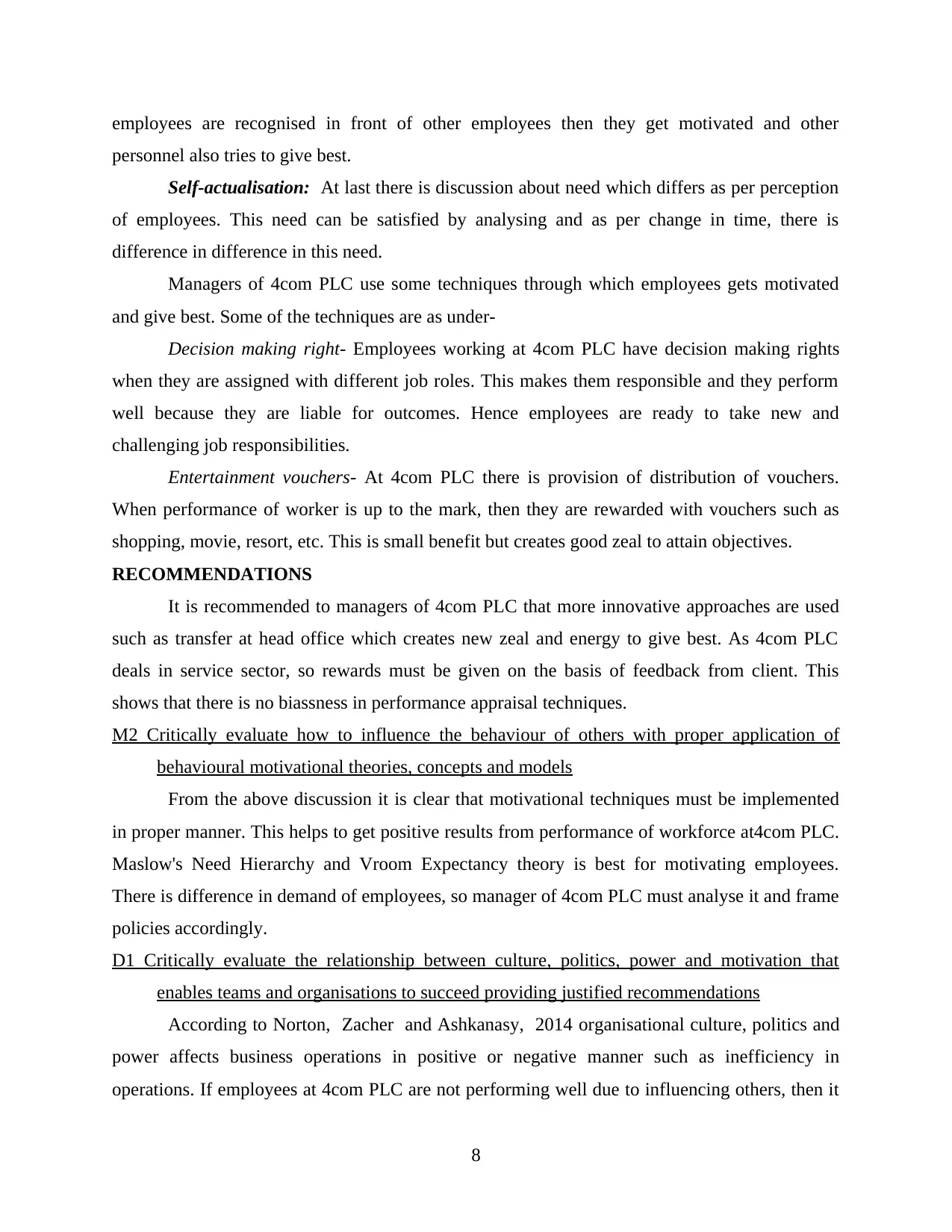
employees are recognised in front of other employees then they get motivated and other
personnel also tries to give best.
Self-actualisation: At last there is discussion about need which differs as per perception
of employees. This need can be satisfied by analysing and as per change in time, there is
difference in difference in this need.
Managers of 4com PLC use some techniques through which employees gets motivated
and give best. Some of the techniques are as under-
Decision making right- Employees working at 4com PLC have decision making rights
when they are assigned with different job roles. This makes them responsible and they perform
well because they are liable for outcomes. Hence employees are ready to take new and
challenging job responsibilities.
Entertainment vouchers- At 4com PLC there is provision of distribution of vouchers.
When performance of worker is up to the mark, then they are rewarded with vouchers such as
shopping, movie, resort, etc. This is small benefit but creates good zeal to attain objectives.
RECOMMENDATIONS
It is recommended to managers of 4com PLC that more innovative approaches are used
such as transfer at head office which creates new zeal and energy to give best. As 4com PLC
deals in service sector, so rewards must be given on the basis of feedback from client. This
shows that there is no biassness in performance appraisal techniques.
M2 Critically evaluate how to influence the behaviour of others with proper application of
behavioural motivational theories, concepts and models
From the above discussion it is clear that motivational techniques must be implemented
in proper manner. This helps to get positive results from performance of workforce at4com PLC.
Maslow's Need Hierarchy and Vroom Expectancy theory is best for motivating employees.
There is difference in demand of employees, so manager of 4com PLC must analyse it and frame
policies accordingly.
D1 Critically evaluate the relationship between culture, politics, power and motivation that
enables teams and organisations to succeed providing justified recommendations
According to Norton, Zacher and Ashkanasy, 2014 organisational culture, politics and
power affects business operations in positive or negative manner such as inefficiency in
operations. If employees at 4com PLC are not performing well due to influencing others, then it
8
personnel also tries to give best.
Self-actualisation: At last there is discussion about need which differs as per perception
of employees. This need can be satisfied by analysing and as per change in time, there is
difference in difference in this need.
Managers of 4com PLC use some techniques through which employees gets motivated
and give best. Some of the techniques are as under-
Decision making right- Employees working at 4com PLC have decision making rights
when they are assigned with different job roles. This makes them responsible and they perform
well because they are liable for outcomes. Hence employees are ready to take new and
challenging job responsibilities.
Entertainment vouchers- At 4com PLC there is provision of distribution of vouchers.
When performance of worker is up to the mark, then they are rewarded with vouchers such as
shopping, movie, resort, etc. This is small benefit but creates good zeal to attain objectives.
RECOMMENDATIONS
It is recommended to managers of 4com PLC that more innovative approaches are used
such as transfer at head office which creates new zeal and energy to give best. As 4com PLC
deals in service sector, so rewards must be given on the basis of feedback from client. This
shows that there is no biassness in performance appraisal techniques.
M2 Critically evaluate how to influence the behaviour of others with proper application of
behavioural motivational theories, concepts and models
From the above discussion it is clear that motivational techniques must be implemented
in proper manner. This helps to get positive results from performance of workforce at4com PLC.
Maslow's Need Hierarchy and Vroom Expectancy theory is best for motivating employees.
There is difference in demand of employees, so manager of 4com PLC must analyse it and frame
policies accordingly.
D1 Critically evaluate the relationship between culture, politics, power and motivation that
enables teams and organisations to succeed providing justified recommendations
According to Norton, Zacher and Ashkanasy, 2014 organisational culture, politics and
power affects business operations in positive or negative manner such as inefficiency in
operations. If employees at 4com PLC are not performing well due to influencing others, then it
8
Secure Best Marks with AI Grader
Need help grading? Try our AI Grader for instant feedback on your assignments.
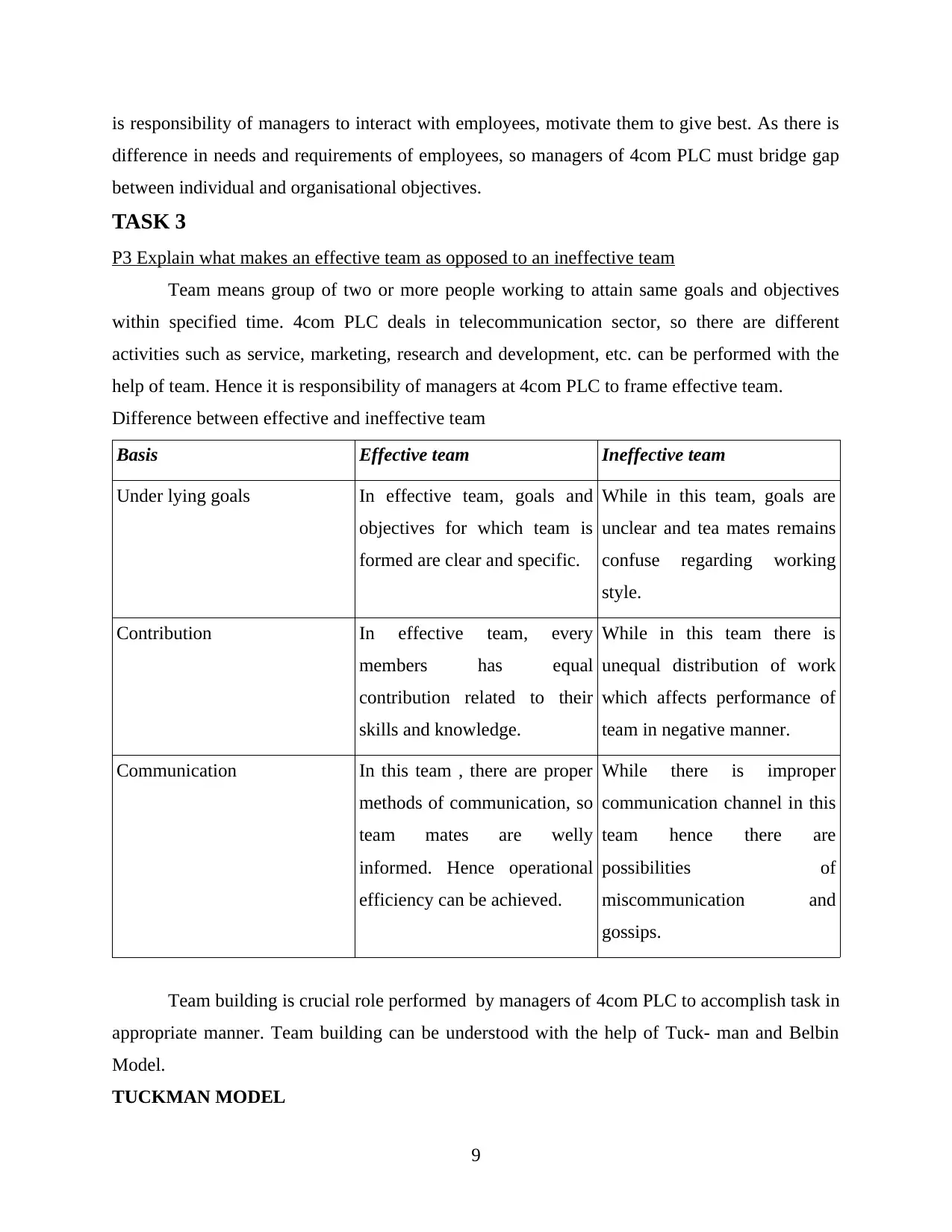
is responsibility of managers to interact with employees, motivate them to give best. As there is
difference in needs and requirements of employees, so managers of 4com PLC must bridge gap
between individual and organisational objectives.
TASK 3
P3 Explain what makes an effective team as opposed to an ineffective team
Team means group of two or more people working to attain same goals and objectives
within specified time. 4com PLC deals in telecommunication sector, so there are different
activities such as service, marketing, research and development, etc. can be performed with the
help of team. Hence it is responsibility of managers at 4com PLC to frame effective team.
Difference between effective and ineffective team
Basis Effective team Ineffective team
Under lying goals In effective team, goals and
objectives for which team is
formed are clear and specific.
While in this team, goals are
unclear and tea mates remains
confuse regarding working
style.
Contribution In effective team, every
members has equal
contribution related to their
skills and knowledge.
While in this team there is
unequal distribution of work
which affects performance of
team in negative manner.
Communication In this team , there are proper
methods of communication, so
team mates are welly
informed. Hence operational
efficiency can be achieved.
While there is improper
communication channel in this
team hence there are
possibilities of
miscommunication and
gossips.
Team building is crucial role performed by managers of 4com PLC to accomplish task in
appropriate manner. Team building can be understood with the help of Tuck- man and Belbin
Model.
TUCKMAN MODEL
9
difference in needs and requirements of employees, so managers of 4com PLC must bridge gap
between individual and organisational objectives.
TASK 3
P3 Explain what makes an effective team as opposed to an ineffective team
Team means group of two or more people working to attain same goals and objectives
within specified time. 4com PLC deals in telecommunication sector, so there are different
activities such as service, marketing, research and development, etc. can be performed with the
help of team. Hence it is responsibility of managers at 4com PLC to frame effective team.
Difference between effective and ineffective team
Basis Effective team Ineffective team
Under lying goals In effective team, goals and
objectives for which team is
formed are clear and specific.
While in this team, goals are
unclear and tea mates remains
confuse regarding working
style.
Contribution In effective team, every
members has equal
contribution related to their
skills and knowledge.
While in this team there is
unequal distribution of work
which affects performance of
team in negative manner.
Communication In this team , there are proper
methods of communication, so
team mates are welly
informed. Hence operational
efficiency can be achieved.
While there is improper
communication channel in this
team hence there are
possibilities of
miscommunication and
gossips.
Team building is crucial role performed by managers of 4com PLC to accomplish task in
appropriate manner. Team building can be understood with the help of Tuck- man and Belbin
Model.
TUCKMAN MODEL
9
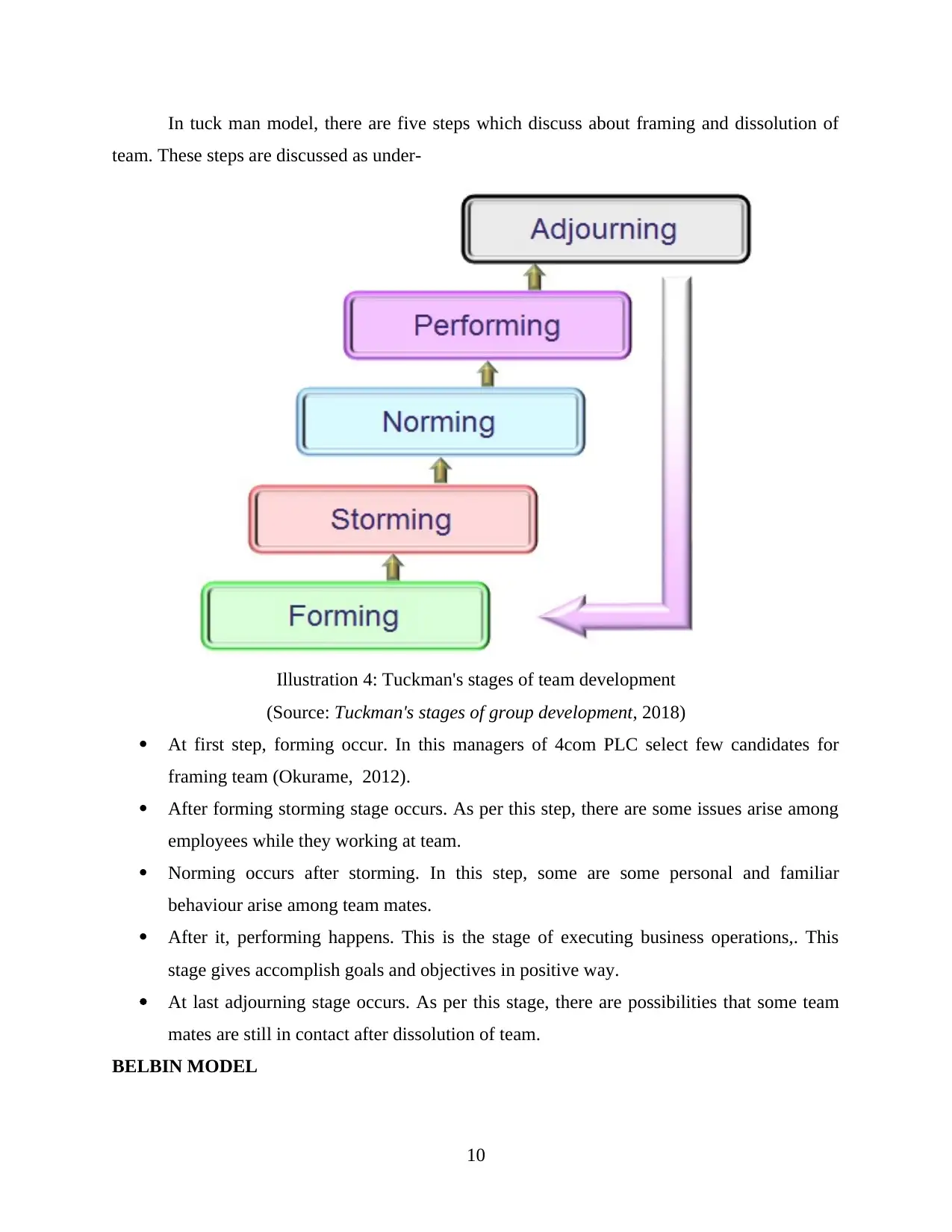
In tuck man model, there are five steps which discuss about framing and dissolution of
team. These steps are discussed as under-
(Source: Tuckman's stages of group development, 2018)
At first step, forming occur. In this managers of 4com PLC select few candidates for
framing team (Okurame, 2012).
After forming storming stage occurs. As per this step, there are some issues arise among
employees while they working at team.
Norming occurs after storming. In this step, some are some personal and familiar
behaviour arise among team mates.
After it, performing happens. This is the stage of executing business operations,. This
stage gives accomplish goals and objectives in positive way.
At last adjourning stage occurs. As per this stage, there are possibilities that some team
mates are still in contact after dissolution of team.
BELBIN MODEL
10
Illustration 4: Tuckman's stages of team development
team. These steps are discussed as under-
(Source: Tuckman's stages of group development, 2018)
At first step, forming occur. In this managers of 4com PLC select few candidates for
framing team (Okurame, 2012).
After forming storming stage occurs. As per this step, there are some issues arise among
employees while they working at team.
Norming occurs after storming. In this step, some are some personal and familiar
behaviour arise among team mates.
After it, performing happens. This is the stage of executing business operations,. This
stage gives accomplish goals and objectives in positive way.
At last adjourning stage occurs. As per this stage, there are possibilities that some team
mates are still in contact after dissolution of team.
BELBIN MODEL
10
Illustration 4: Tuckman's stages of team development
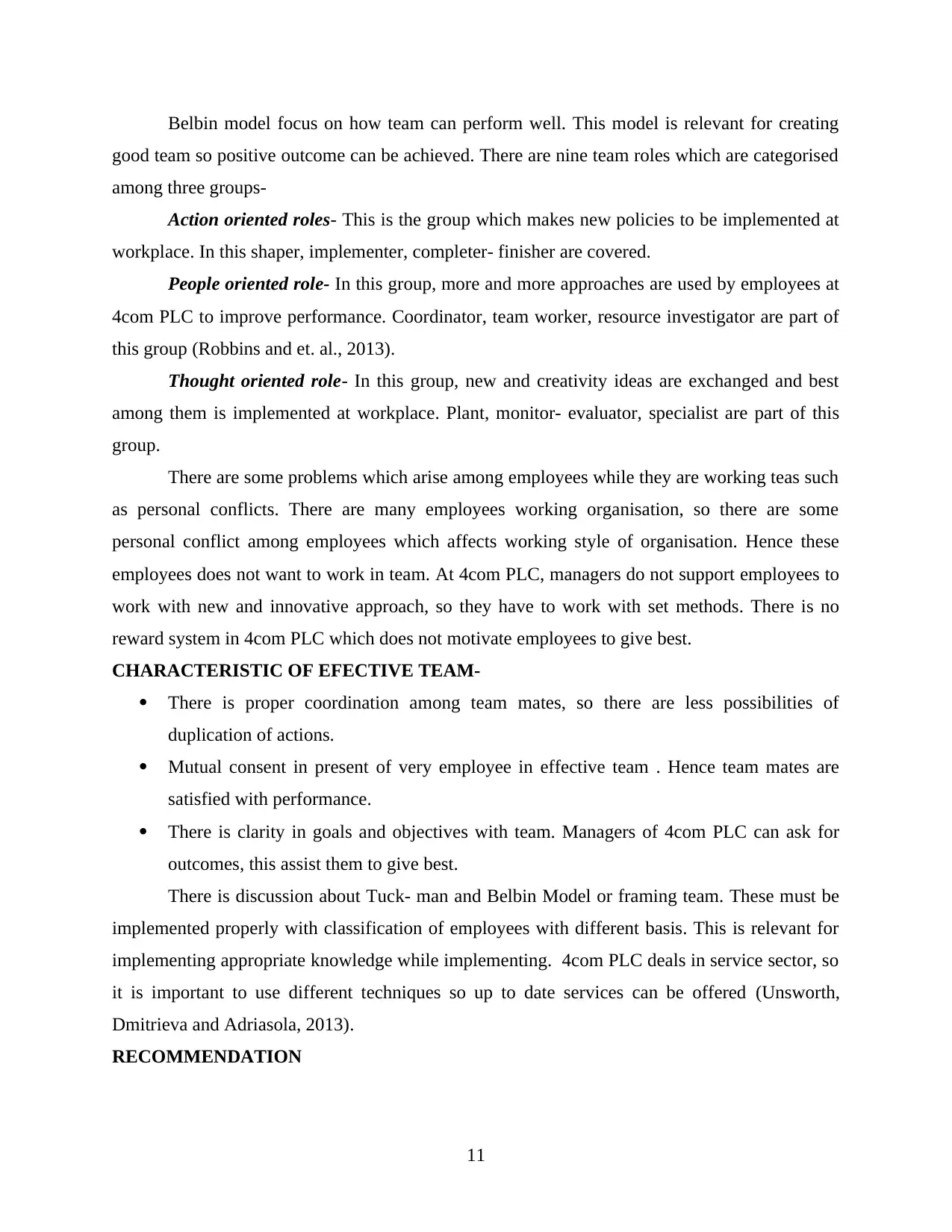
Belbin model focus on how team can perform well. This model is relevant for creating
good team so positive outcome can be achieved. There are nine team roles which are categorised
among three groups-
Action oriented roles- This is the group which makes new policies to be implemented at
workplace. In this shaper, implementer, completer- finisher are covered.
People oriented role- In this group, more and more approaches are used by employees at
4com PLC to improve performance. Coordinator, team worker, resource investigator are part of
this group (Robbins and et. al., 2013).
Thought oriented role- In this group, new and creativity ideas are exchanged and best
among them is implemented at workplace. Plant, monitor- evaluator, specialist are part of this
group.
There are some problems which arise among employees while they are working teas such
as personal conflicts. There are many employees working organisation, so there are some
personal conflict among employees which affects working style of organisation. Hence these
employees does not want to work in team. At 4com PLC, managers do not support employees to
work with new and innovative approach, so they have to work with set methods. There is no
reward system in 4com PLC which does not motivate employees to give best.
CHARACTERISTIC OF EFECTIVE TEAM-
There is proper coordination among team mates, so there are less possibilities of
duplication of actions.
Mutual consent in present of very employee in effective team . Hence team mates are
satisfied with performance.
There is clarity in goals and objectives with team. Managers of 4com PLC can ask for
outcomes, this assist them to give best.
There is discussion about Tuck- man and Belbin Model or framing team. These must be
implemented properly with classification of employees with different basis. This is relevant for
implementing appropriate knowledge while implementing. 4com PLC deals in service sector, so
it is important to use different techniques so up to date services can be offered (Unsworth,
Dmitrieva and Adriasola, 2013).
RECOMMENDATION
11
good team so positive outcome can be achieved. There are nine team roles which are categorised
among three groups-
Action oriented roles- This is the group which makes new policies to be implemented at
workplace. In this shaper, implementer, completer- finisher are covered.
People oriented role- In this group, more and more approaches are used by employees at
4com PLC to improve performance. Coordinator, team worker, resource investigator are part of
this group (Robbins and et. al., 2013).
Thought oriented role- In this group, new and creativity ideas are exchanged and best
among them is implemented at workplace. Plant, monitor- evaluator, specialist are part of this
group.
There are some problems which arise among employees while they are working teas such
as personal conflicts. There are many employees working organisation, so there are some
personal conflict among employees which affects working style of organisation. Hence these
employees does not want to work in team. At 4com PLC, managers do not support employees to
work with new and innovative approach, so they have to work with set methods. There is no
reward system in 4com PLC which does not motivate employees to give best.
CHARACTERISTIC OF EFECTIVE TEAM-
There is proper coordination among team mates, so there are less possibilities of
duplication of actions.
Mutual consent in present of very employee in effective team . Hence team mates are
satisfied with performance.
There is clarity in goals and objectives with team. Managers of 4com PLC can ask for
outcomes, this assist them to give best.
There is discussion about Tuck- man and Belbin Model or framing team. These must be
implemented properly with classification of employees with different basis. This is relevant for
implementing appropriate knowledge while implementing. 4com PLC deals in service sector, so
it is important to use different techniques so up to date services can be offered (Unsworth,
Dmitrieva and Adriasola, 2013).
RECOMMENDATION
11
Paraphrase This Document
Need a fresh take? Get an instant paraphrase of this document with our AI Paraphraser
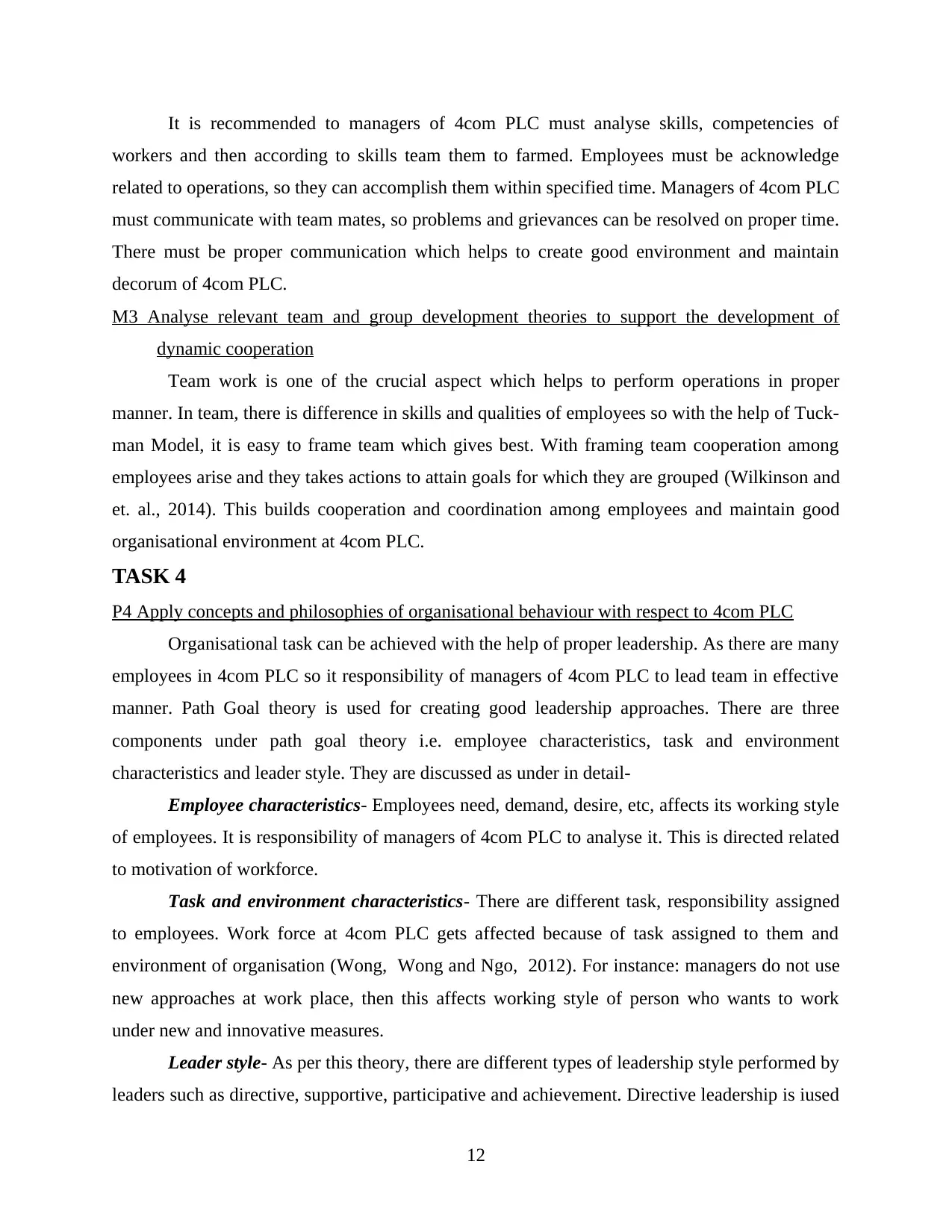
It is recommended to managers of 4com PLC must analyse skills, competencies of
workers and then according to skills team them to farmed. Employees must be acknowledge
related to operations, so they can accomplish them within specified time. Managers of 4com PLC
must communicate with team mates, so problems and grievances can be resolved on proper time.
There must be proper communication which helps to create good environment and maintain
decorum of 4com PLC.
M3 Analyse relevant team and group development theories to support the development of
dynamic cooperation
Team work is one of the crucial aspect which helps to perform operations in proper
manner. In team, there is difference in skills and qualities of employees so with the help of Tuck-
man Model, it is easy to frame team which gives best. With framing team cooperation among
employees arise and they takes actions to attain goals for which they are grouped (Wilkinson and
et. al., 2014). This builds cooperation and coordination among employees and maintain good
organisational environment at 4com PLC.
TASK 4
P4 Apply concepts and philosophies of organisational behaviour with respect to 4com PLC
Organisational task can be achieved with the help of proper leadership. As there are many
employees in 4com PLC so it responsibility of managers of 4com PLC to lead team in effective
manner. Path Goal theory is used for creating good leadership approaches. There are three
components under path goal theory i.e. employee characteristics, task and environment
characteristics and leader style. They are discussed as under in detail-
Employee characteristics- Employees need, demand, desire, etc, affects its working style
of employees. It is responsibility of managers of 4com PLC to analyse it. This is directed related
to motivation of workforce.
Task and environment characteristics- There are different task, responsibility assigned
to employees. Work force at 4com PLC gets affected because of task assigned to them and
environment of organisation (Wong, Wong and Ngo, 2012). For instance: managers do not use
new approaches at work place, then this affects working style of person who wants to work
under new and innovative measures.
Leader style- As per this theory, there are different types of leadership style performed by
leaders such as directive, supportive, participative and achievement. Directive leadership is iused
12
workers and then according to skills team them to farmed. Employees must be acknowledge
related to operations, so they can accomplish them within specified time. Managers of 4com PLC
must communicate with team mates, so problems and grievances can be resolved on proper time.
There must be proper communication which helps to create good environment and maintain
decorum of 4com PLC.
M3 Analyse relevant team and group development theories to support the development of
dynamic cooperation
Team work is one of the crucial aspect which helps to perform operations in proper
manner. In team, there is difference in skills and qualities of employees so with the help of Tuck-
man Model, it is easy to frame team which gives best. With framing team cooperation among
employees arise and they takes actions to attain goals for which they are grouped (Wilkinson and
et. al., 2014). This builds cooperation and coordination among employees and maintain good
organisational environment at 4com PLC.
TASK 4
P4 Apply concepts and philosophies of organisational behaviour with respect to 4com PLC
Organisational task can be achieved with the help of proper leadership. As there are many
employees in 4com PLC so it responsibility of managers of 4com PLC to lead team in effective
manner. Path Goal theory is used for creating good leadership approaches. There are three
components under path goal theory i.e. employee characteristics, task and environment
characteristics and leader style. They are discussed as under in detail-
Employee characteristics- Employees need, demand, desire, etc, affects its working style
of employees. It is responsibility of managers of 4com PLC to analyse it. This is directed related
to motivation of workforce.
Task and environment characteristics- There are different task, responsibility assigned
to employees. Work force at 4com PLC gets affected because of task assigned to them and
environment of organisation (Wong, Wong and Ngo, 2012). For instance: managers do not use
new approaches at work place, then this affects working style of person who wants to work
under new and innovative measures.
Leader style- As per this theory, there are different types of leadership style performed by
leaders such as directive, supportive, participative and achievement. Directive leadership is iused
12
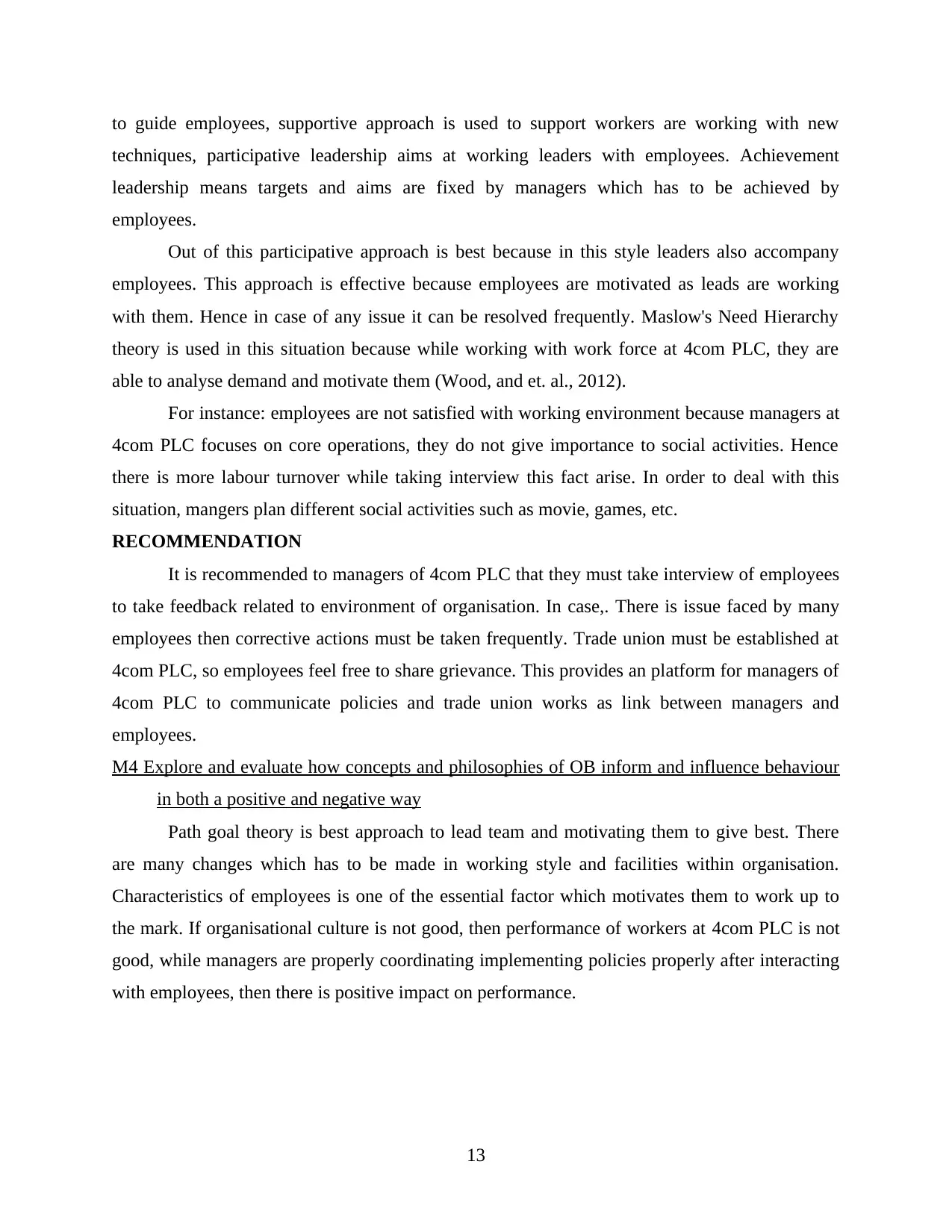
to guide employees, supportive approach is used to support workers are working with new
techniques, participative leadership aims at working leaders with employees. Achievement
leadership means targets and aims are fixed by managers which has to be achieved by
employees.
Out of this participative approach is best because in this style leaders also accompany
employees. This approach is effective because employees are motivated as leads are working
with them. Hence in case of any issue it can be resolved frequently. Maslow's Need Hierarchy
theory is used in this situation because while working with work force at 4com PLC, they are
able to analyse demand and motivate them (Wood, and et. al., 2012).
For instance: employees are not satisfied with working environment because managers at
4com PLC focuses on core operations, they do not give importance to social activities. Hence
there is more labour turnover while taking interview this fact arise. In order to deal with this
situation, mangers plan different social activities such as movie, games, etc.
RECOMMENDATION
It is recommended to managers of 4com PLC that they must take interview of employees
to take feedback related to environment of organisation. In case,. There is issue faced by many
employees then corrective actions must be taken frequently. Trade union must be established at
4com PLC, so employees feel free to share grievance. This provides an platform for managers of
4com PLC to communicate policies and trade union works as link between managers and
employees.
M4 Explore and evaluate how concepts and philosophies of OB inform and influence behaviour
in both a positive and negative way
Path goal theory is best approach to lead team and motivating them to give best. There
are many changes which has to be made in working style and facilities within organisation.
Characteristics of employees is one of the essential factor which motivates them to work up to
the mark. If organisational culture is not good, then performance of workers at 4com PLC is not
good, while managers are properly coordinating implementing policies properly after interacting
with employees, then there is positive impact on performance.
13
techniques, participative leadership aims at working leaders with employees. Achievement
leadership means targets and aims are fixed by managers which has to be achieved by
employees.
Out of this participative approach is best because in this style leaders also accompany
employees. This approach is effective because employees are motivated as leads are working
with them. Hence in case of any issue it can be resolved frequently. Maslow's Need Hierarchy
theory is used in this situation because while working with work force at 4com PLC, they are
able to analyse demand and motivate them (Wood, and et. al., 2012).
For instance: employees are not satisfied with working environment because managers at
4com PLC focuses on core operations, they do not give importance to social activities. Hence
there is more labour turnover while taking interview this fact arise. In order to deal with this
situation, mangers plan different social activities such as movie, games, etc.
RECOMMENDATION
It is recommended to managers of 4com PLC that they must take interview of employees
to take feedback related to environment of organisation. In case,. There is issue faced by many
employees then corrective actions must be taken frequently. Trade union must be established at
4com PLC, so employees feel free to share grievance. This provides an platform for managers of
4com PLC to communicate policies and trade union works as link between managers and
employees.
M4 Explore and evaluate how concepts and philosophies of OB inform and influence behaviour
in both a positive and negative way
Path goal theory is best approach to lead team and motivating them to give best. There
are many changes which has to be made in working style and facilities within organisation.
Characteristics of employees is one of the essential factor which motivates them to work up to
the mark. If organisational culture is not good, then performance of workers at 4com PLC is not
good, while managers are properly coordinating implementing policies properly after interacting
with employees, then there is positive impact on performance.
13
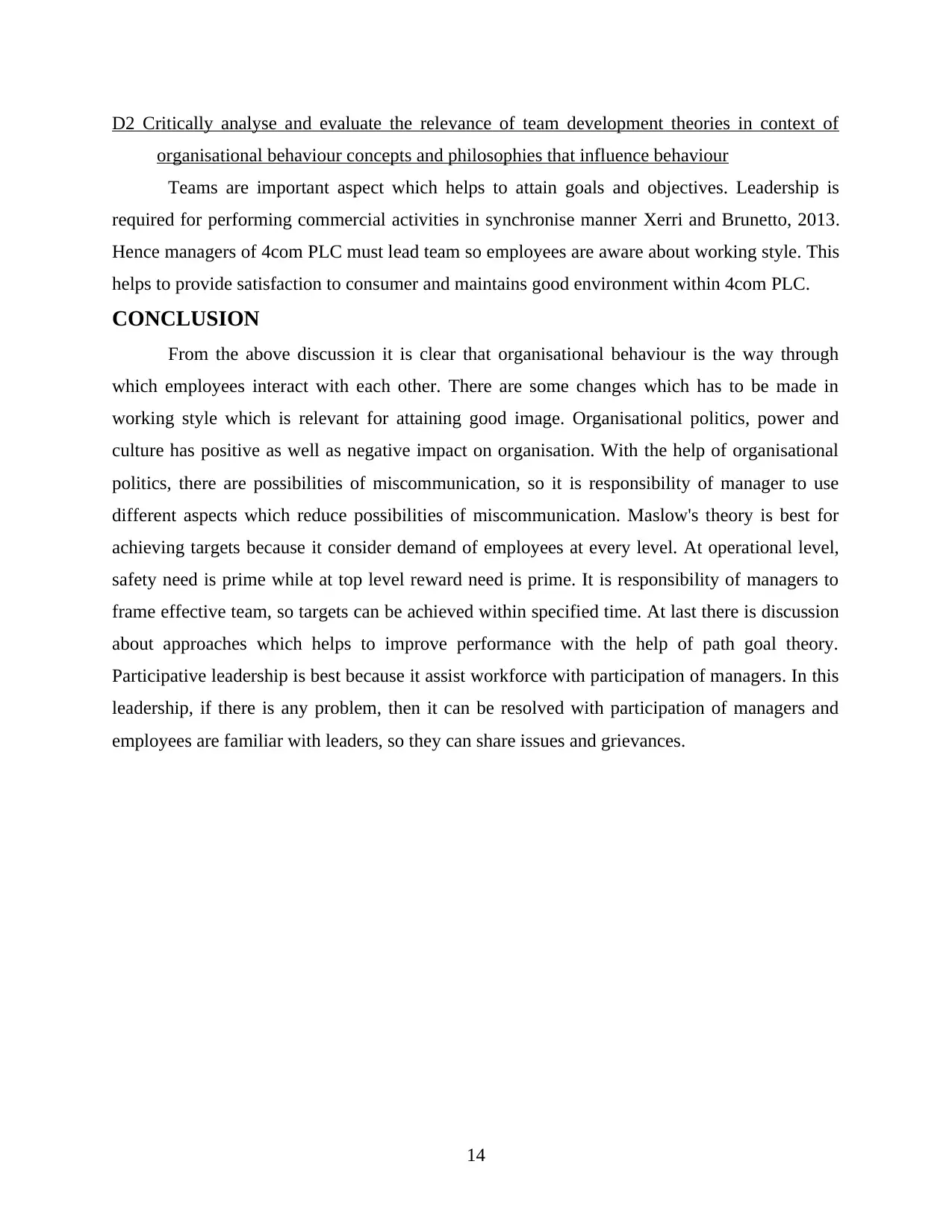
D2 Critically analyse and evaluate the relevance of team development theories in context of
organisational behaviour concepts and philosophies that influence behaviour
Teams are important aspect which helps to attain goals and objectives. Leadership is
required for performing commercial activities in synchronise manner Xerri and Brunetto, 2013.
Hence managers of 4com PLC must lead team so employees are aware about working style. This
helps to provide satisfaction to consumer and maintains good environment within 4com PLC.
CONCLUSION
From the above discussion it is clear that organisational behaviour is the way through
which employees interact with each other. There are some changes which has to be made in
working style which is relevant for attaining good image. Organisational politics, power and
culture has positive as well as negative impact on organisation. With the help of organisational
politics, there are possibilities of miscommunication, so it is responsibility of manager to use
different aspects which reduce possibilities of miscommunication. Maslow's theory is best for
achieving targets because it consider demand of employees at every level. At operational level,
safety need is prime while at top level reward need is prime. It is responsibility of managers to
frame effective team, so targets can be achieved within specified time. At last there is discussion
about approaches which helps to improve performance with the help of path goal theory.
Participative leadership is best because it assist workforce with participation of managers. In this
leadership, if there is any problem, then it can be resolved with participation of managers and
employees are familiar with leaders, so they can share issues and grievances.
14
organisational behaviour concepts and philosophies that influence behaviour
Teams are important aspect which helps to attain goals and objectives. Leadership is
required for performing commercial activities in synchronise manner Xerri and Brunetto, 2013.
Hence managers of 4com PLC must lead team so employees are aware about working style. This
helps to provide satisfaction to consumer and maintains good environment within 4com PLC.
CONCLUSION
From the above discussion it is clear that organisational behaviour is the way through
which employees interact with each other. There are some changes which has to be made in
working style which is relevant for attaining good image. Organisational politics, power and
culture has positive as well as negative impact on organisation. With the help of organisational
politics, there are possibilities of miscommunication, so it is responsibility of manager to use
different aspects which reduce possibilities of miscommunication. Maslow's theory is best for
achieving targets because it consider demand of employees at every level. At operational level,
safety need is prime while at top level reward need is prime. It is responsibility of managers to
frame effective team, so targets can be achieved within specified time. At last there is discussion
about approaches which helps to improve performance with the help of path goal theory.
Participative leadership is best because it assist workforce with participation of managers. In this
leadership, if there is any problem, then it can be resolved with participation of managers and
employees are familiar with leaders, so they can share issues and grievances.
14
Secure Best Marks with AI Grader
Need help grading? Try our AI Grader for instant feedback on your assignments.
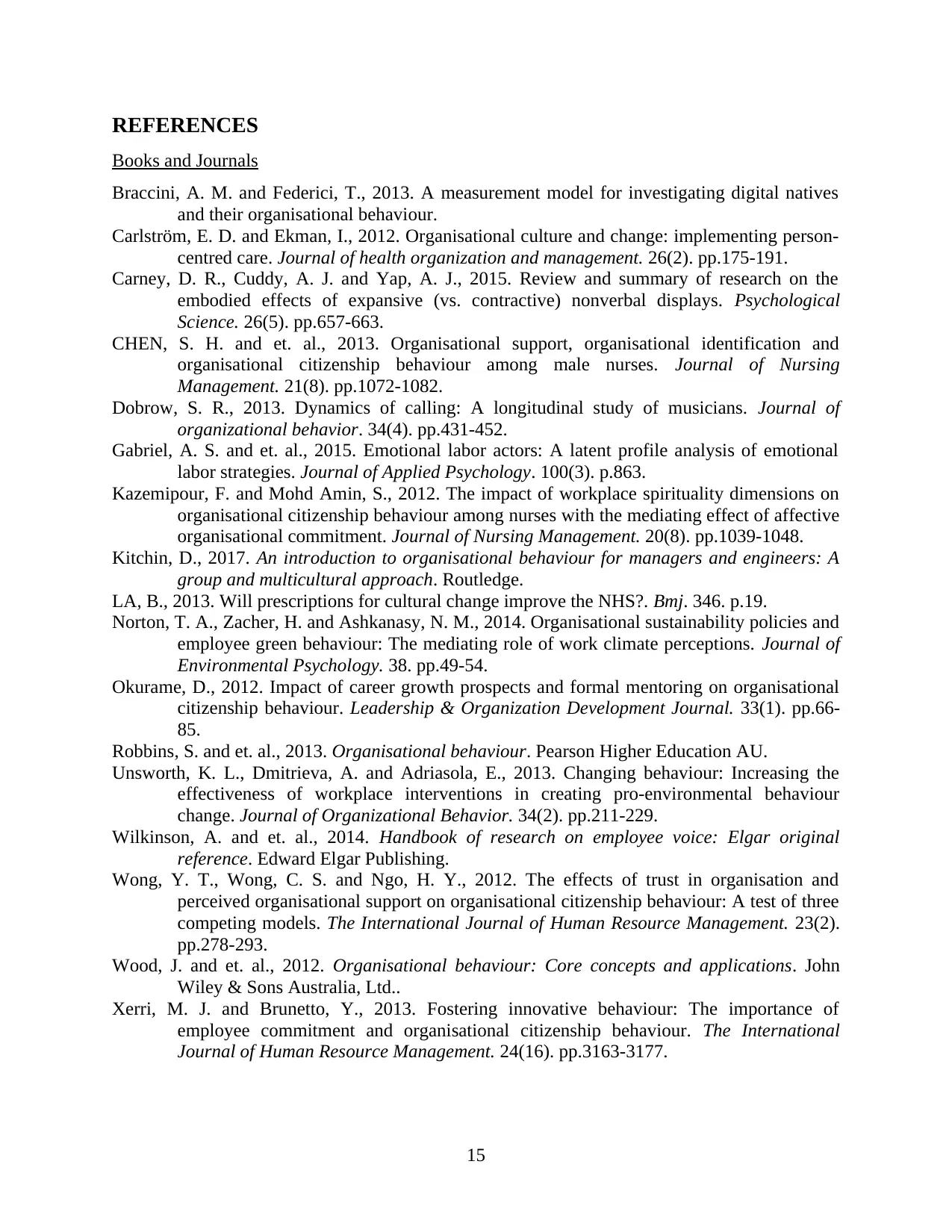
REFERENCES
Books and Journals
Braccini, A. M. and Federici, T., 2013. A measurement model for investigating digital natives
and their organisational behaviour.
Carlström, E. D. and Ekman, I., 2012. Organisational culture and change: implementing person-
centred care. Journal of health organization and management. 26(2). pp.175-191.
Carney, D. R., Cuddy, A. J. and Yap, A. J., 2015. Review and summary of research on the
embodied effects of expansive (vs. contractive) nonverbal displays. Psychological
Science. 26(5). pp.657-663.
CHEN, S. H. and et. al., 2013. Organisational support, organisational identification and
organisational citizenship behaviour among male nurses. Journal of Nursing
Management. 21(8). pp.1072-1082.
Dobrow, S. R., 2013. Dynamics of calling: A longitudinal study of musicians. Journal of
organizational behavior. 34(4). pp.431-452.
Gabriel, A. S. and et. al., 2015. Emotional labor actors: A latent profile analysis of emotional
labor strategies. Journal of Applied Psychology. 100(3). p.863.
Kazemipour, F. and Mohd Amin, S., 2012. The impact of workplace spirituality dimensions on
organisational citizenship behaviour among nurses with the mediating effect of affective
organisational commitment. Journal of Nursing Management. 20(8). pp.1039-1048.
Kitchin, D., 2017. An introduction to organisational behaviour for managers and engineers: A
group and multicultural approach. Routledge.
LA, B., 2013. Will prescriptions for cultural change improve the NHS?. Bmj. 346. p.19.
Norton, T. A., Zacher, H. and Ashkanasy, N. M., 2014. Organisational sustainability policies and
employee green behaviour: The mediating role of work climate perceptions. Journal of
Environmental Psychology. 38. pp.49-54.
Okurame, D., 2012. Impact of career growth prospects and formal mentoring on organisational
citizenship behaviour. Leadership & Organization Development Journal. 33(1). pp.66-
85.
Robbins, S. and et. al., 2013. Organisational behaviour. Pearson Higher Education AU.
Unsworth, K. L., Dmitrieva, A. and Adriasola, E., 2013. Changing behaviour: Increasing the
effectiveness of workplace interventions in creating pro‐environmental behaviour
change. Journal of Organizational Behavior. 34(2). pp.211-229.
Wilkinson, A. and et. al., 2014. Handbook of research on employee voice: Elgar original
reference. Edward Elgar Publishing.
Wong, Y. T., Wong, C. S. and Ngo, H. Y., 2012. The effects of trust in organisation and
perceived organisational support on organisational citizenship behaviour: A test of three
competing models. The International Journal of Human Resource Management. 23(2).
pp.278-293.
Wood, J. and et. al., 2012. Organisational behaviour: Core concepts and applications. John
Wiley & Sons Australia, Ltd..
Xerri, M. J. and Brunetto, Y., 2013. Fostering innovative behaviour: The importance of
employee commitment and organisational citizenship behaviour. The International
Journal of Human Resource Management. 24(16). pp.3163-3177.
15
Books and Journals
Braccini, A. M. and Federici, T., 2013. A measurement model for investigating digital natives
and their organisational behaviour.
Carlström, E. D. and Ekman, I., 2012. Organisational culture and change: implementing person-
centred care. Journal of health organization and management. 26(2). pp.175-191.
Carney, D. R., Cuddy, A. J. and Yap, A. J., 2015. Review and summary of research on the
embodied effects of expansive (vs. contractive) nonverbal displays. Psychological
Science. 26(5). pp.657-663.
CHEN, S. H. and et. al., 2013. Organisational support, organisational identification and
organisational citizenship behaviour among male nurses. Journal of Nursing
Management. 21(8). pp.1072-1082.
Dobrow, S. R., 2013. Dynamics of calling: A longitudinal study of musicians. Journal of
organizational behavior. 34(4). pp.431-452.
Gabriel, A. S. and et. al., 2015. Emotional labor actors: A latent profile analysis of emotional
labor strategies. Journal of Applied Psychology. 100(3). p.863.
Kazemipour, F. and Mohd Amin, S., 2012. The impact of workplace spirituality dimensions on
organisational citizenship behaviour among nurses with the mediating effect of affective
organisational commitment. Journal of Nursing Management. 20(8). pp.1039-1048.
Kitchin, D., 2017. An introduction to organisational behaviour for managers and engineers: A
group and multicultural approach. Routledge.
LA, B., 2013. Will prescriptions for cultural change improve the NHS?. Bmj. 346. p.19.
Norton, T. A., Zacher, H. and Ashkanasy, N. M., 2014. Organisational sustainability policies and
employee green behaviour: The mediating role of work climate perceptions. Journal of
Environmental Psychology. 38. pp.49-54.
Okurame, D., 2012. Impact of career growth prospects and formal mentoring on organisational
citizenship behaviour. Leadership & Organization Development Journal. 33(1). pp.66-
85.
Robbins, S. and et. al., 2013. Organisational behaviour. Pearson Higher Education AU.
Unsworth, K. L., Dmitrieva, A. and Adriasola, E., 2013. Changing behaviour: Increasing the
effectiveness of workplace interventions in creating pro‐environmental behaviour
change. Journal of Organizational Behavior. 34(2). pp.211-229.
Wilkinson, A. and et. al., 2014. Handbook of research on employee voice: Elgar original
reference. Edward Elgar Publishing.
Wong, Y. T., Wong, C. S. and Ngo, H. Y., 2012. The effects of trust in organisation and
perceived organisational support on organisational citizenship behaviour: A test of three
competing models. The International Journal of Human Resource Management. 23(2).
pp.278-293.
Wood, J. and et. al., 2012. Organisational behaviour: Core concepts and applications. John
Wiley & Sons Australia, Ltd..
Xerri, M. J. and Brunetto, Y., 2013. Fostering innovative behaviour: The importance of
employee commitment and organisational citizenship behaviour. The International
Journal of Human Resource Management. 24(16). pp.3163-3177.
15
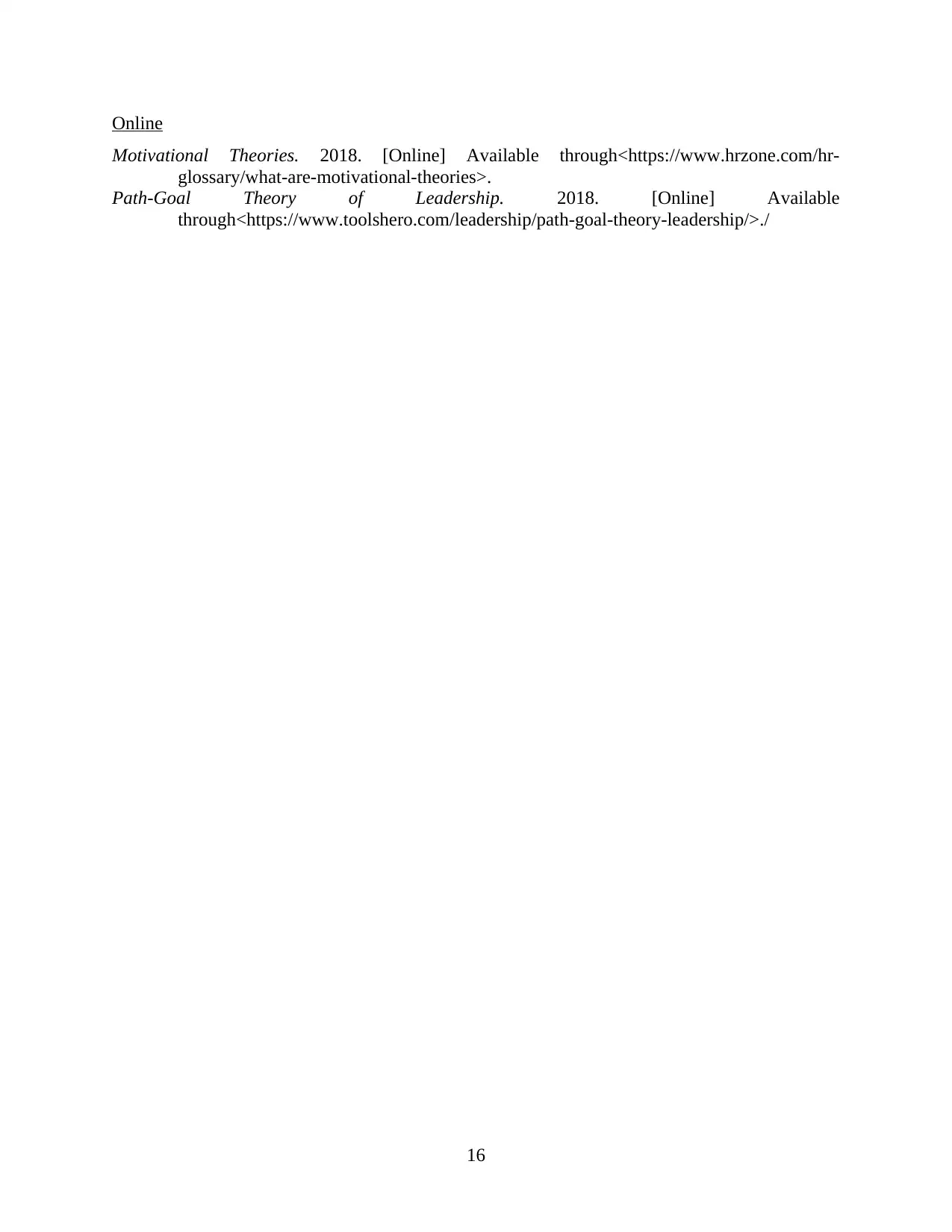
Online
Motivational Theories. 2018. [Online] Available through<https://www.hrzone.com/hr-
glossary/what-are-motivational-theories>.
Path-Goal Theory of Leadership. 2018. [Online] Available
through<https://www.toolshero.com/leadership/path-goal-theory-leadership/>./
16
Motivational Theories. 2018. [Online] Available through<https://www.hrzone.com/hr-
glossary/what-are-motivational-theories>.
Path-Goal Theory of Leadership. 2018. [Online] Available
through<https://www.toolshero.com/leadership/path-goal-theory-leadership/>./
16
1 out of 18
Related Documents
Your All-in-One AI-Powered Toolkit for Academic Success.
+13062052269
info@desklib.com
Available 24*7 on WhatsApp / Email
![[object Object]](/_next/static/media/star-bottom.7253800d.svg)
Unlock your academic potential
© 2024 | Zucol Services PVT LTD | All rights reserved.





